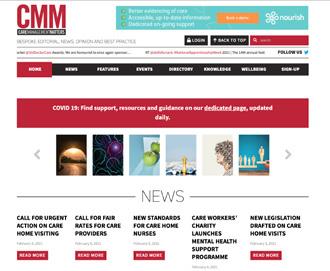STRETCHED TO THE LIMIT
End of life care nursing
Intergenerational links Recruitment








End of life care nursing
Intergenerational links Recruitment







Social Care
David Brindle shares his reaction to the leaked WhatsApp messages relating to the Government’s handling of the pandemic and updates on the COVID-19 inquiry.
Inside CQC
In her final column, Debbie Ivanova, Director for people with a learning disability and autistic people at the Care Quality Commission (CQC), reflects on her time working for the regulator.
CMM News Into Perspective
This month, our experts reflect on how much progress has been made in relation to The Mayhew Review: Future Proofing Retirement Living – Easing the care and housing crises report.

Celebrating Excellence
The celebrations for the Markel 3rd Sector Care Awards 2023 took place on 3rd March. Find out who won in each category.
Event Review
Can care be cool? This issue, CMM attended and reviewed The Outstanding Society’s webinar, which focused on strengthening equality, inclusion and diversity within social care.
What’s On?
Straight Talk
The Government has set out its roadmap to support providers with digital systems. Katie Thorn, Project Lead at Digital Social Care, updates on future digital projects.
Re-defining best practice: How the lantern flower model is supporting end of life care nursing

Heather Richardson, the Director of Education, Research and Policy at St Christopher’s Hospice, and Marie Cooper, a Senior Nurse Advisor CARE at St Christopher’s Hospice, share insights into a new end of life care model.
Stretched to the limit: Learning disability and autism fee rates
The Association for Real Change (ARC) Learning Disability and Autism Research Unit has published the results of a Freedom of Information (FOI) request. Clive Parry, Director of ARC, shares the findings.
The power of friendship: England’s biggest intergenerational project with care homes
My Home Life’s three-year project on intergenerational links has come to an end. Tom Owen, Director of My Home Life, updates on how the project has impacted on people in the community.

Your shop window: How to respond to negative online reviews













With so many digital platforms available to write reviews, care providers face mounting pressure to respond accordingly. Maurice Richmond, PLMR, a PR and public relations agency dedicated to the care sector, shares his advice.
Resource Finder: Recruitment
CMM profiles some of the leading recruitment companies specialising in adult social care to help providers strengthen recruitment planning.

editor@caremanagementmatters.co.uk


Editor: Olivia Hubbard
Commissioning Editor: Angharad Burnham



Content Editors: Aislinn Thompson, Henry Thornton
Designer: Rebecca Mendil
Director of Creative Operations: Lisa Werthmann
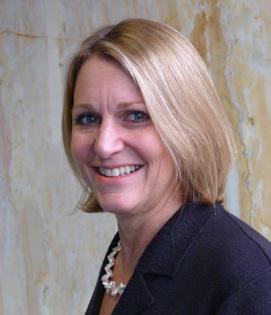
Studio Manager: Jamie Harvey

sales@caremanagementmatters.co.uk
01223 207770
Advertising Manager: Aaron Barber aaron.barber@carechoices.co.uk

Director of Sales: David Werthmann david.werthmann@carechoices.co.uk



Sign up to receive the latest magazines and news for FREE. info@caremanagementmatters.co.uk
01223 207770
www.caremanagementmatters.co.uk
Care Management Matters is published by Care Choices Ltd who cannot be held responsible for views expressed by contributors. Care Management Matters © Care Choices Ltd 2023 CCL REF NO: CMM 20.2
CMM magazine is officially part of the membership entitlement of:


The Government is running out of places to hide when questioned on its response to the COVID-19 pandemic. As the COVID-19 inquiry gets underway, David Brindle shares his view on the leaked WhatsApp messages and updates on the inquiry’s progress.

We can probably agree that Care Minister Helen Whately endured a torrid time defending the Government’s handling of COVID19 while the pandemic was raging. Her halting parliamentary and media performances prompted often cruel sarcasm and derision.
But Whately has since noticeably upped her presentational game and she also emerges with credit from the mass leak to the Daily Telegraph of WhatsApp messages from and to her former boss, Matt Hancock. Indeed, she is one of the few people to do so.
We now know that Whately was forced to defend in public a number of policies with which she did not agree. In private, she was pressing fruitlessly for testing of
all care home residents and staff, irrespective of any symptoms; she was questioning the rushed discharge of hospital patients to care homes to free up capacity; she was protesting vehemently about inadequate and delayed supplies of PPE to social care settings; and she was pressing repeatedly for the selective loosening of blanket visiting restrictions imposed on care homes.
Small wonder that her appearances at the Commons despatch box and on TV and radio were often less than convincing.
For better or worse, and setting aside the ethics of the parties involved, the leak of the cache of more than 100,000 WhatsApp messages has shone a welcome light on progress of
the COVID-19 inquiry. Before the Telegraph first splashed its (no doubt) expensively procured treasure on 1st March, the inquiry was lumbering along in its quiet way and attracting little mainstream attention.
In truth, it is still in the foothills of its mammoth task. But three years on from the first lockdown, with the care sector still counting its 45,000plus deaths from COVID-19, or more accurately ‘involving’ the virus, it’s timely to ask how and when social care will have its experiences and issues addressed.
So far the inquiry, chaired by former judge Baroness Hallett, has begun three modules: one on resilience and preparedness for the pandemic; a second
on decision-making in central Government; and a third on the pandemic’s impact on healthcare systems. The parameters of the latter have been set quite tightly around healthcare to the exclusion of other forms of care and support. Overall, there doesn’t appear to be a lot of scope yet for social care issues to be raised.
We shall see how far module one – resilence and preparedeness – extends to social care when public hearings begin in June. But otherwise the sector’s hopes rest on the definition of further modules, yet to be announced but expected to include PPE and wider procurement, testing and tracing and indeed something about the sector itself.
Perhaps this should come as no surprise. Social care is well accustomed to being an afterthought – which is of course why its pandemic experience was so traumatic and so deadly.
An exchange from the WhatsApp leaks makes the point perfectly. On 18th April 2020, Whately told Hancock at 6pm that new data showed there had been 10,000 excess deaths of people in care homes or receiving homecare in the previous six weeks. She asked for an urgent meeting. At just before 10pm Hancock replied: ‘Aargh sorry – just got this – tmrw.’ For social care, it always seems a case of help tomorrow.

Are you paying too much for your policies and procedures?
What we can offer you:
Policies and procedures that meet the new CQC Quality Statements and Regulations.

A quality management system approved by CQC over many years.
Used by number of customers who have achieved CQC Outstanding grading.





Updated regularly in line with changes in standards and improved practice.
Used by over 10,000 staff in social care and growing.
Produced by Albert Cook former principal inspector, Fellow of the Chartered Quality Institute and Chartered Quality Professional.
We can offer you the Bettal Care4 CQC Compliant Quality Management System:
• Policies and procedures for just £70 per month.
• You will pay double this amount if you buy from our main competitors.
Before you renew your contract with your current supplier or considering purchasing policies and procedures, please contact us to learn more about what Bettal can offer your service.
Please contact us for more information.
This column will be my last before I retire from my role as Director for people with a learning disability and autistic people at Care Quality Commission (CQC). In my 26 years as a regulator, I’ve seen many examples of great care to balance some of the unacceptable practice –most recently at Ryver House in Plymouth.
Ryver House is a care home where younger adults with a learning disability and autistic people live. The care provided here was outstanding. During our visit, we found a person-centred, inclusive and empowering culture. People led flourishing lives and were supported to express themselves in the choices they made, such as the work they undertook, sports they followed, the clothes they wore and the music they enjoyed.
It’s clear to me that the care these younger adults were receiving was built around them. Their ambitions, needs and concerns were listened to and acted upon. They were supported to be themselves and to be their best selves.
Being listened to, really heard, is a privilege. I appreciate how important it is to my self-worth and it has added value to my roles throughout my career. I also know that our own preconceptions of people can impact on how we listen to others. We all see life through a different lens, and that lens may cloud or colour our judgement. Challenging our own biases and preconceptions – and supporting our colleagues to do the same –will help us all be heard clearly and truthfully.
The transformation journey that CQC is on will help us reflect on the things that we
don’t know. We’ll be checking for gaps in our knowledge and supporting inspectors to get out and about more. By assessing services in ways that help us to spot the signs of developing closed cultures, we can check them out before harm occurs – not afterwards. Listening to all voices, examining all truths and hearing different perspectives can help us all take note and step in before cultures close, before voices fall silent and before the focus on meeting individual needs is lost at the expense of running the service.
One way we’re doing this is by convening an expert advisory group for people with a learning disability and autistic people. This is made up of people with lived experience, organisations that represent them, representatives of provider groups and other strategic stakeholders. We’re working together to help identify where CQC can have the most impact on reducing inequalities for people with a learning disability and autistic people; keeping people well; enabling people to get the best care where they live; and ensuring everyone in health and social care is working to reduce restrictive practice in their services.
We also continue to encourage more people, and their loved ones, to share experiences of care through our Because We All Care campaign. To date it has driven nearly 94,000 people to share experiences of health and social care. Our campaign focus in April 2023 is on people with a learning disability and autistic people because they are more likely to experience poorer care and inequalities. We encourage you to engage with, and share, the social media posts when you see them and we thank you for your ongoing support.
Saying goodbye will not be easy; however, I know I am leaving the work I have started in good hands. My colleague, Rebecca BushellBauers, will be taking on the Director role and, along with Deputy Director Hayley Moore, the team will continue to champion the need to speak up and be heard.
Rebecca’s passion is to tackle inequalities faced by people with a learning disability and unacceptable practice in health and social care. Rebecca said, ‘People deserve the right to live as citizens and lead their best lives. This is what motivates me.
‘I am excited about my new role, including how we can use our new powers from April 2023 to assess local authorities and integrated care systems to influence and shape commissioning for people with a learning disability and autistic people to ensure the right model of care is accessible to support them to lead their best lives.’
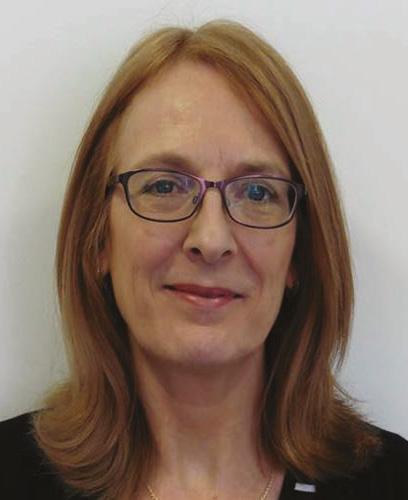
Hayley’s focus is on embedding the positive work undertaken so far around safeguarding and closed cultures to identify and act on early warning signs of poor care or culture. Commenting on the work, Hayley said, 'I want us to be ambitious in protecting people’s human rights, and in being proactive in how we regulate across health and social care to enable people to live a life free from harm or abuse.’
So, as I leave CQC, I take with me huge gratitude for the privilege of having been heard. Of being able to speak and to be listened to over the years. Keep speaking and, importantly, keep listening.
In her final column for CMM, Debbie Ivanova, Director for people with a learning disability and autistic people at the Care Quality Commission (CQC), reflects on her time working for the regulator and says being listened to has been a real privilege.



How does digital care planning help your residents?
Receive person centred care: Care staff can quickly access residents medication information and preferences, allowing them to delivery timely, person-centred care.
Happier residents: Staff are able to spend more quality time with residents due to the decrease in admin tasks A
Social care leaders have been left feeling disappointed that the care sector has not been properly recognised.
The Independent Care Group (ICG) says there was nothing in the Chancellor's speech to tackle the 1.6 million people who cannot get the care they need and that the announcement was a ‘further kick in the teeth for the care of the country’s most vulnerable’.
Professor Martin Green OBE, Chief Executive of Care England, said, ‘The Autumn Statement announced £7.5bn for the social care sector
over the next two years, aimed at creating an additional 200,000 new care packages, supporting the discharge of people from hospital to ease NHS backlog, whilst also being split across adult and child services. Care England’s recent Fair Cost of Care analysis shows that, even with this funding, the deficit for older person’s residential and nursing home stands at around £2bn per annum. While the £7.5bn represented a step in the right direction, the Spring Budget was an opportunity to reinforce this progress
and move towards a sustainable funding settlement for the sector. It was an opportunity that, unfortunately, the Government did not take, with a notable lack of any announcements targeted at the sector.’
Professor Vic Rayner OBE, Chief Executive of The National Care Forum, said, ‘The next General Election has to take place by the end of 2024, and the announcements made in the Budget are those that the Government is banking on making a tangible difference by then.
The UK COVID-19 inquiry enters its next phase to examine the UK’s response to, and the impact of, the COVID-19 pandemic.
John’s Campaign, The Relatives & Residents Association (R&RA) and The Patients Association have UK COVID-19 inquiry
Core Participant Status and the inquiry held its first preliminary hearing for its third investigation (Module 3), looking at the impact of the pandemic
on healthcare, on Tuesday 28th February.
Module 3 of the UK COVID-19 inquiry will consider the healthcare consequences of the Government and public response to the pandemic. It will examine the capacity of healthcare systems to respond to a pandemic and how this evolved during the COVID-19 pandemic. It will consider the primary, secondary and tertiary healthcare sectors and
services and people’s experience of healthcare during the pandemic, including through illustrative accounts. It will also examine healthcarerelated inequalities (such as in relation to death rates, PPE and oximeters), with further detailed consideration to follow in a separate designated module.
As Core Participants, John’s Campaign, The R&RA and The Patients Association will be able
Adding, ‘Making working in care more affordable is absolutely the right thing to do. Two elements of the Budget support that ambition, and we welcome both the increased availability of funded childcare and the extension of the Energy Price Guarantee to ensure that households are not faced with further catastrophic increases in energy bills. However, we are disappointed that there is no further tailored support for the catastrophic energy costs being faced by all of our not-for-profit members.’
Adopt a Grandparent, an initiative initially created to help virtually pair care home residents with volunteers to combat loneliness throughout the pandemic, has appointed a Director of Fundraising – as the project-turned-charity sets out its 2023 plans to reach 100,000 sign-ups.
Cornerstone Healthcare has announced the appointment of a dedicated, in-house NAPPI (Non-Abusive Psychological and Physical Intervention) trainer to work across all of its services. Jonathan Spencer will be responsible for delivering training on psychological and physical techniques to all staff and assisting the group’s nurses in personalising care plans around any NAPPI requirements that an individual may have.
to see investigation evidence, make statements at inquiry hearings and suggest lines of questioning to counsel to the inquiry. The organisations will be working to ensure that the experience of healthcare service users is a key consideration in the Inquiry’s analysis.
Visit the COVID-19 inquiry website to stay updated with developments: https:// covid19.public-inquiry.uk
Liaise, a provider of specialist care services for adults with learning disabilities, mental health and other complex needs, has appointed Deborah Cotton-Soares as Director of Quality and Governance. With over 30 years of experience in the health and social care sector, including as the Director of Quality at Consensus Support, and Head of Registration at the CQC, Deborah will lead quality focus and governance across the group.
Orion Health has appointed Mark Hindle as its new vice president for the UK and Ireland. Mark has joined the leading supplier of digital tools to improve healthcare experience from Evergreen Life, a personal health record app provider. In his new role, he said his priority will be to support Orion Health’s existing customers and help them upgrade to the latest, cloudbased version of its platform.

The Association of Mental Health Providers (AMHP) has launched a new campaign calling for urgent support for community mental health services.
The AMHP’s new #MHEqualityNow campaign aims to raise awareness of the exponentially rising unmet need for mental health services. The campaign is calling on Government to recognise the critical part mental health charities play in delivering mental health services by committing to sustainable ongoing and future funding for the sector.
After more than 10 years of austerity, and the cumulative impact of pandemic and cost of living pressures, the AMHP, the national voice for charities providing mental health and wellbeing services in England and Wales, reveals its insights into the demand on mental health services.
Over eight million people are supported by mental health charities – that is one in eight of the population – and a survey of the AMHP's 300 plus members has revealed: a 100% increase in waiting times for access to specialist referral and crisis services since summer 2022; and a 50% rise in people presenting with increasing needs, particularly with anxieties related to money and
housing because of the cost of living crisis.
Kathy Roberts, Chief Executive of AMHP, said, ‘The demand for services is outstripping the allocation of funding and resources that mental health charities have available to them and the AMHP is seeing many close their doors, or considering doing so. Without the charity supporting a person to live safe and well in the community, not only will some of the most vulnerable people in our society be left without help, but their deteriorating mental health will most likely result in increased pressure on the NHS.’
The AMHP calculates more than two million people are either unable to access any mental health care or need more specialist services than those being provided.
Kathy adds, ‘Our concerns are compounded when we see that there is significant variation across the country that local authorities and the NHS have to spend on mental health. This means when and how a person might receive support is entirely dependent on where they live, and there is an even greater inequality of access if you belong to a marginalised community.’
For more information, visit www.amhp.org.uk
Care England has found that local authorities were underfunding older people's care homes by over £2bn per annum during 2021/22. This does not account for inflation, which peaked at over 11% in 2022 and is projected to exceed 7% for 2023-24 according to the Office for National Statistics (ONS).
These findings follow an analysis of the average fee rates currently paid by local authorities across England and the reported Fair Cost of Care rates published on 1st February 2023 in its Annex B submissions to the Department of Health and Social Care. The Fair Cost of Care was a Governmentled exercise designed to achieve a shared understanding of the local cost of providing care.
Across all local authorities and just over 178,000 local authority funded residents in England, as of April 2022, the average difference between what a local authority paid for residential care fees and the Fair Cost of Care was £218 per week, whilst this figure increased to £231 per week for nursing care.
Care England’s analysis identified regions of concern, which were significantly underfunding care according to its Fair Cost of Care calculations.
In the North East, consisting
Adults receiving social care in England and Wales are being failed if they try to challenge decisions made by local authorities. This is according to an inquiry conducted by the Equality and Human Rights Commission (EHRC).
Evidence published by the equality and human rights regulator reveals local authority processes are confusing and slow, with risks that people do not get the care they need. Social care users, and their loved ones, find making complaints difficult and stressful, often at a
time when they are in crisis.
The EHRC launched its inquiry in July 2021 to understand the experiences of social care users and carers who have challenged decisions made by local authorities. It examined the procedures in place among local authorities across England and Wales and gathered insight from social care professionals too.
The inquiry found that some people are deterred from seeking help by a complicated system that should instead be upholding their rights to challenge decisions about their care.
The inquiry heard that some people are not given crucial information about how to challenge decisions, and under half of the local authorities surveyed always signpost users to independent advice or support. This creates unnecessary barriers for users and fears of negative consequences if complaints are made, including loss of access to the social care needed.
The recommendations include a call for the UK Government to make the Local Government and Social Care Ombudsman (LGSCO) the statutory complaints
of 12 local authorities, providing care to over 14,000 local authority care home residents, a local authority would be required to uplift average fees paid in 2021-22 for residential care by over 18% and 24% for nursing to meet the Fair Cost of Care at a cost of over £100m per annum across the 12 authorities.
In the South East, consisting of 19 local authorities, providing care to over 30,000 local authority care home residents, the average uplift for residential care would need to be over 32% and 25% for nursing care to address the gap between the average fee paid and the Fair Cost of Care at a cost during 202122 totalling a gap of over £400m per annum.
Of particular significance, Care England found that 10 of the largest local authorities were significantly underfunding care and would require, on average, an uplift of 31% for residential care and 27% for nursing care funded residents to meet the Fair Cost of Care, resulting in a gap of over £500m per annum.
Four local authorities, Dorset, Newcastle upon Tyne, Reading and St Helens, reported the Fair Cost of Care rate below the average fee rate they paid to care homes.
standards authority for adult social care in England. There is also a call for the LGSCO to receive new powers to initiate investigations into areas of concern without the need for individual complaints.
Michael King, the Local Government Ombudsman, said, ‘We welcome the EHRC’s latest report which echoes the issues we regularly find in our investigations about adult care services, of which we uphold more than two thirds.'
Visit the EHRC website to read the findings.

As care has grown more complex, so has the way you do things. It’s time to bring it all together.
IQ:caremanager is the next generation of our software designed specifically for home care providers. It brings together the tools you need to plan, deliver, monitor and manage home care. Made using all of our experience, knowledge and passion for the care sector. So that you can focus on the most important thing. Care.


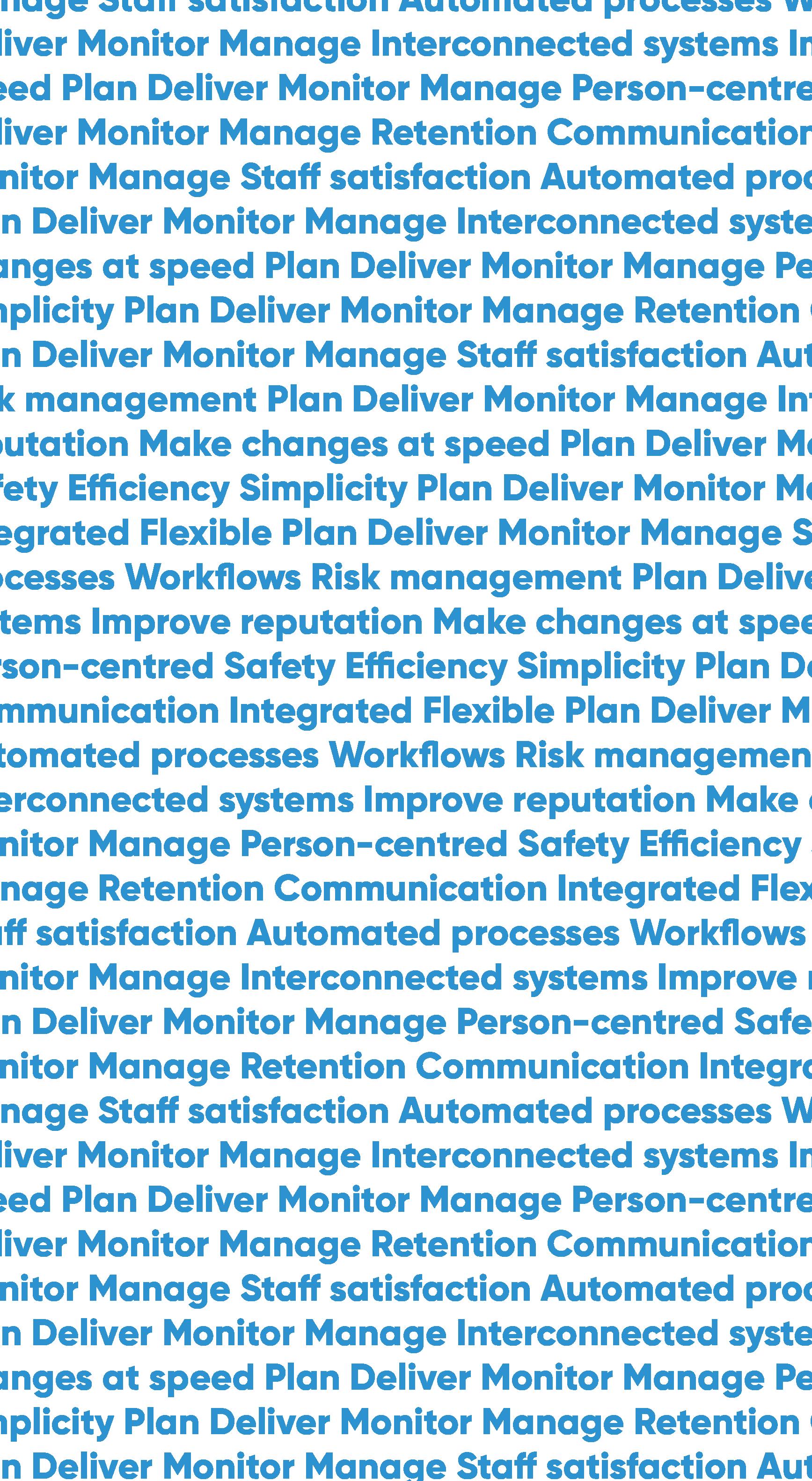
The Sector Pulse Check report, a piece of independent research commissioned by national learning disability charity Hft and Care England, illustrates the unique challenges facing the sector following the pandemic, cost of living crisis and decades of underinvestment by central Government.
Based on a representative survey of care providers in England, the report describes how cost pressures, including sky-high utility bills – rising by as much as 500% for some providers – and increasing workforce pay resulted in 82% of providers being in deficit or facing a decrease in their surplus in 2022.
Financial and workforce pressures have also seen 42% of providers forced to close parts of their organisation or hand back care contracts to local authorities.
One survey respondent described the current climate
as ‘genuinely the most perilous period in the organisation’s 50-year history', going onto say that their 'ability to provide residential care and supported living is seriously compromised.’
The Sector Pulse Check report illustrates that workforce-related cost pressures, driven by increases in the National Living Wage, were a standout concern for providers, with 92% citing workforce pay as a key pressure on their organisation. 81% said that local authority fee increases did not cover the increasing costs of workforce pay in 2022.
Low wages relative to other sectors, as well as a perception that better opportunities exist elsewhere, were identified as key drivers of difficulties in recruitment and retention, with 95% of respondents saying that increasing pay would have the most impact on boosting staff numbers.
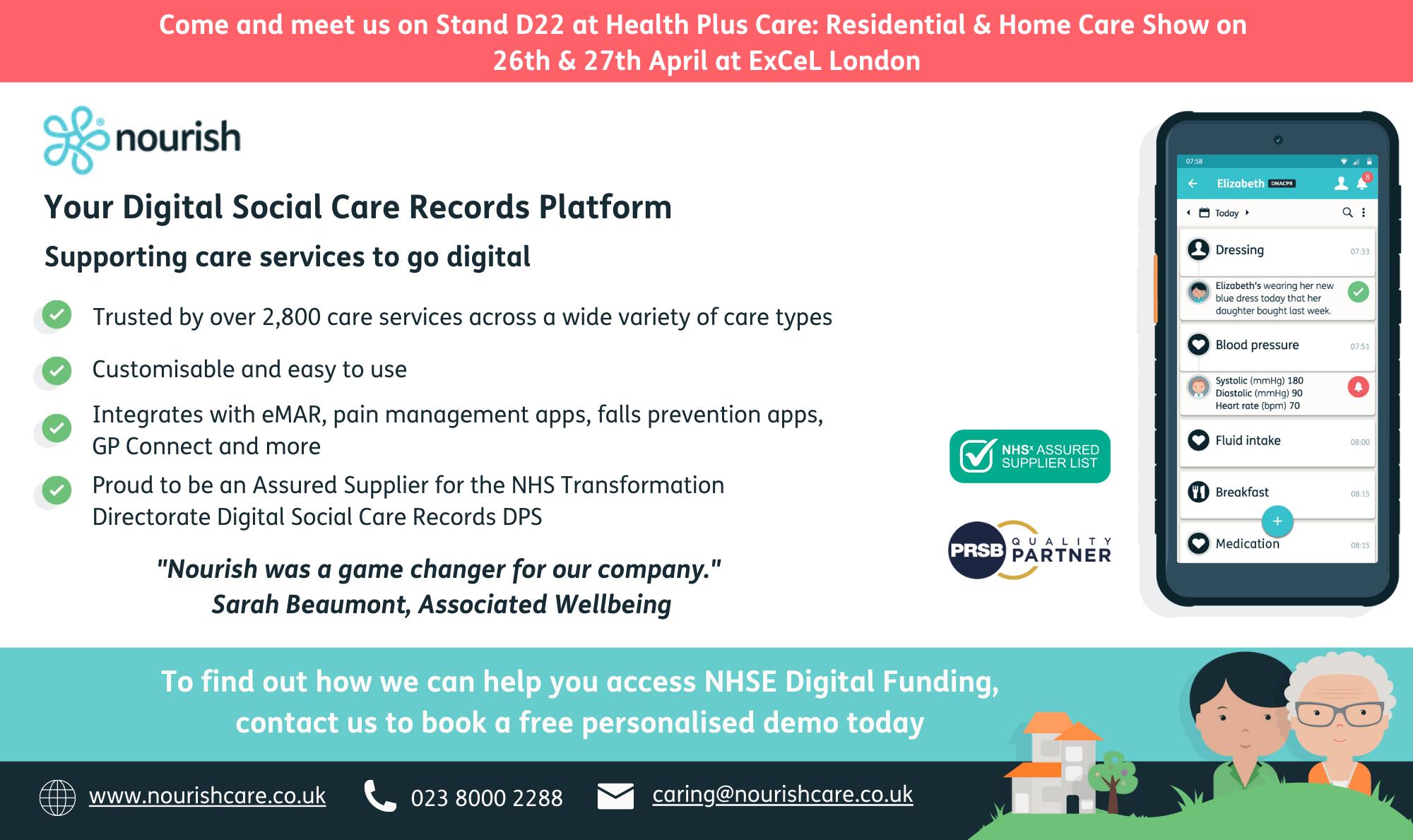
A new guide has been launched to help councils and social care providers when introducing new and emerging technology into adult social care.
The guide sets out recommendations for councils and social care providers looking to implement new and emerging technology, including AI and other data-intensive forms of technology. It is produced by the University of Birmingham and RAND Europe, through the BRACE Rapid Evaluation Centre, and is co-badged by Digital Social Care and social care partners within the NHS England Transformation Directorate.
The booklet distils findings from a BRACE study, funded by the National Institute for Health and Care Research, which looked at decision making and implementation processes for home sensors with AI capabilities, which
had been piloted across different social care sites in England.
Despite this potentially powerful use of AI technology, the study found that there were issues with implementation and decision making which kept the technology from meeting expectations in terms of having a positive impact on care.
Helen Whately, Minister for Social Care at the Department of Health & Social Care, said, ‘As part of our social care reforms we will encourage care providers to take up opportunities to use technology to improve care, but this won’t happen overnight. That’s why we’ve helped to develop this guide. It will help care organisations make more use of innovations in what they do day-to-day. It’s a great way to make caring better and easier – whether that’s reducing the number of forms to fill out or adopting better technology to allow people to live at home independently for longer.’
Care Management Matters (CMM), in association with The National Care Forum (NCF), is delighted to announce the launch of a new CMM Insight webinar series.
Six unmissable sessions will be hosted between March and November, discussing the sector’s most pressing current affairs topics – ranging from recruitment and retention to integrated care systems. The webinar series will equip delegates with the information they need to successfully navigate the year ahead in an ever-changing sector landscape.
The webinars will be led by senior members of the NCF team, including Professor Vic Rayner OBE, Chief Executive Officer, Liz Jones, Policy Director, Adam Hunt, Digital Transformation Lead and Nathan Jones, Senior Policy, Research and Projects Officer. The webinars will be free to attend and
will be hosted on Zoom.
Lisa Werthmann, Director at CMM, said, ‘CMM is celebrating its 20th anniversary in 2023 and this new webinar series is a welcome addition to the CMM Insight portfolio. The webinars will be delivered in collaboration with a number of leaders in the sector and we hope that as many people as possible can join us and benefit from national discussions and essential learning.
‘The NCF represents the voices of not-for-profit care organisations, and I am excited about this next chapter in our partnership and look forward to welcoming delegates to the webinars over the coming months.’
Further details about the webinars, including how to book your place, can be found online. Visit the CMM website and follow CMM on Twitter for the latest information.
The Care Innovation Challenge, a hackathon-style creative weekend of idea generation and prototype trialling, returns in July 2023. With cash prizes, expert mentoring and guaranteed media coverage this is an opportunity not to be missed.
The Challenge, hosted by the Care Innovation Hub (CIH), is run by the National Care Forum (NCF) and is supported by Think Local Act Personal (TLAP) through its National Co-production Advisory Group (NCAG) to ensure people with lived experience help to create solutions to key challenges faced by the care sector. NCF is dedicated to developing innovation in the social care and support sector and this is a natural home to drive the CIH into the future.
Professor Vic Rayner OBE, NCF’s Chief Executive Officer, said, ‘We welcome anyone who wants a chance to be part of the future of care. We hope to receive
applications from a diverse group of people, including individuals and teams from care providers, undergraduates and postgraduates from universities and people with social entrepreneurial ambitions.
‘You do not need to be an expert in social care, or have any experience of social care yourself, to apply. You do not need to have any technical skills. You just need to have an intention to improve the quality of life of those receiving care in the UK.’
Successful applicants will be invited to a creative weekend of idea generation and prototype trialling at Coventry University on 1st-2nd July 2023. There will be expert advice available from CIH sponsors and founding supporters which include RWK Goodman, Marrgo, Care Management Matters, Care Friends and Borough Care to help participants in developing their ideas.
Person Centred Software (PCS) has partnered with OneLondon and the NHS London Region Digital Social Care team, to help care providers connect to the London Care Record so that care teams can provide the best possible care to their residents.
The London Care Record enables health and care professionals involved in people's care to access a secure view of people's health and care information whenever they require it. Introduced to speed up communication between care professionals, help save lives and improve the safety and quality of care, the London Care Record, enabled by a network of health information exchanges (HIEs) which join up data safely and securely, can show care professionals a wealth of information, such as GP records, diagnoses, allergies and much more.
For the first time, care homes across London can access a
joined-up secure view of a person’s health and care information – at any time, whenever they need it. This information facilitates doctors, nurses, and other health and social care professionals’ involvement in a resident’s care to make better, safer and more informed decisions.
Person Centred Software’s London-based customers, namely care home providers, have been connected to the London Care Record during a trial period to help care teams provide the best possible care to their residents.

Commenting on the partnership, Andrew Coles, Chief Executive of Person Centred Software, said, ‘All in all, we see the partnership as a vital step in improving the overall quality of care within the sector while showcasing our confidence in continuing to push the boundaries of care with greater accountability and better outcomes for UK residents.’
The National Care Forum (NCF) has announced its partnership with Oomph! – the leading wellbeing provider for care settings.
The partnership offers NCF members who are new to the Oomph! On Demand digital platform two months' free access, as part of the national effort to improve rehabilitation and intermediate care and support for people leaving hospital.
The recent Government announcement regarding the £200m funding on discharging patients from acute beds into care settings to improve patient care and system flow, presents an opportunity for care home providers to demonstrate their expertise to rehabilitate people to be able to live their best lives.
A well-designed rehabilitation or intermediate care service can improve people’s health and wellbeing outcomes, reduce
hospital admissions and re-admissions, reduce delayed discharges and prevent an unnecessary length of stay in hospital.
The Oomph! On Demand digital platform enables care workers to create bespoke rehabilitation plans for people living in care so they can take part in specialist activity programmes to expedite their recovery and return to good health.
The programmes are developed specifically to the person’s individual needs and interests and include wellbeing, mental health, dementia and nutrition, empowering care homes to put expert rehabilitation plans in place. Furthermore, Oomph! On Demand links to Electronic Care Systems and includes a detailed reporting function to measure and demonstrate rehabilitation outcomes for people.



Following two years of nominal growth in beds between openings and closures, the care homes for older people market in England shrunk in 2022.
As a continuing trend over a number of years, around two care homes have closed for every one that has opened. However, the new homes are larger than those that have closed which has reduced the net loss of beds.
According to CSI Market Intelligence in its eight annual report, Say Hello Wave Goodbye 2022, 123 care homes opened against 247 closures, with a net loss of 230 beds. The openings were the lowest since 2015 and were 23% down on openings in 2021.
The openings equate to around only a 1.3% market increase, against a 2.6% decrease through closures. This is much in line with the average

Leading care campaign groups the Relatives & Residents Association (R&RA) and Rights for Residents have joined forces.
Following the merger, the Rights For Residents campaign will continue under R&RA. The merged organisations are also in the process of a rebrand, including a new look and a new name which will launch over the next couple of months.

Rights for Residents was set up in the summer of 2020 by Jenny
Morrison and Diane Mayhew as a direct response to the impact of lockdown restrictions on Jenny’s mum, who was living in care at the time. The Relatives & Residents Association was set up as a charity 30 years ago by Dorothy White, who suddenly found herself shut out of decisions when her mother moved into care. Since then, the charity has been supporting older people and their families with information and advice about their rights, and
number of care home openings and closures since 2015, when CSI Market Intelligence began its reporting.
On a regional basis, there were only two areas that gained beds across the year, in London and West Midlands, whilst the largest number of losses were in the South East, South West and North West.
Mike Short, Founder and Director at CSI Market Intelligence, said, ‘When one considers the commercial
pressures that are being experienced within the care home market, and varied quality of stock in the marketplace, shedding 2.5% of all homes each year is not that massive.
‘However, with a fast-increasing ageing population, it is the number of new homes that needs to be higher than we have been experiencing over the last eight years.’ The report is available to download via the CSI website.
fighting for change to ensure people receive high-quality care. During the pandemic their lobbying and campaigning secured many changes to the visiting guidance.
The campaigners' shared goal is to strengthen the rights of people using care services, so that everyone can enjoy a good quality of life with the support they need to thrive. In the group’s campaigning, the group says there is still so much to do as it continues its call for a new right to
a Care Supporter.
Helen Wildbore, Director of the Relatives & Residents Association, said, ‘We are excited to be coming together as a united voice to fight for care rights. With the care sector on its knees, now is the time for people needing care and their families to be heard and to change the care system for good. Care must be recognised as vital to the health of the country, with the rights of people at its heart.’


A telephone befriending scheme set up by Methodist Homes (MHA) has helped two individuals create an amazing friendship.
MHA set up the telephone befriending service to offer support and companionship to older people who feel or are at risk of becoming lonely and/or socially isolated across the UK.
John Stedman was in a very difficult place following the death of his wife Sheila, whom he was married to for 57 years.
He was encouraged by his grief counsellor who helped him to get in touch with the befriending team at MHA. John then got involved in the scheme and that was where he was introduced to 23-yearold volunteer Ellie Tyzack in September 2022.
Since then, the pair have been having weekly calls via the telephone and virtually on ZOOM. Speaking on the service John said, ‘The calls with Ellie have really helped me through a very difficult time in my life.
‘The befriending service at MHA is a wonderful initiative and something that will continue to help me and hopefully plenty of other people out there. The befriending team encouraged me a great deal and helped me to speak and I am feeling a lot better now.’
MHA is currently recruiting telephone befrienders to help more older people like John. To find out more and get involved visit, www.mha.org.uk/getinvolved/volunteering/roles/ befriending/
Social care provider Precious Homes has announced changes intended to position the company for the future. In recent months, the company has strengthened its senior team, invested in people and systems and has now announced a brand refresh to reflect the changes.
Founded in 1996, Precious has experience and expertise in supporting autistic people and people with learning disabilities. The company has grown over the years and offers supported living and residential care at more than 40 locations, covering London, Birmingham, Dudley, Gloucester, Milton Keynes and Torquay.
In October 2022, Rory Passmore joined the team as Chief Executive, bringing with him many years of experience in healthcare management. Rory now leads a team of very experienced care sector professionals, including Becs
New analysis from Age UK has found that every day, 14 people exhaust their assets paying for care that is essential for them to carry on living. A year on from the Prime Minister’s pledge that no one would have to sell their home to pay for their care, the findings reveal that older people have spent more than £7bn buying their own care in that time.
available for everyone who needs it. The petition was signed by 109,306 people before the pandemic struck.
Age UK is calling on the Government to resolve the severe underfunding that afflicted social care even before the pandemic arrived and which meant it was in no position to stand up to COVID-19 when it struck.

Gratton as Commerical Director, Mark Penney as Managing Director – Operations, Tamara Nikitin as Interim Head of HR, Victoria Pilkington as Clinical, Quality and Governance Director, and Emma Eckersley as CFO.
The new team is committed to developing a culture of continuous improvement within the business and putting people first. As part of this, the company has also recently filled new management positions including Health and Safety, Learning and Development, and Data Protection.
To reflect these positive changes, the company has announced a new logo, visual identity and website.
Reflecting on the changes, Rory Passmore, Chief Executive of Precious Homes, said, ‘We have created a new and modern identity that reflects our strong history while putting the focus firmly on the future and, crucially, on people.’
In England in 2018/19, the latest year for which figures are available, 5,190 people were classified as 'self-funders with depleted funds' – this represents a sharp increase of more than a third (37%) in the numbers who find themselves in this position, compared to the previous year.
In the absence of social care reform and of a Governmentbacked system which shares the financial risk of developing a need for care, significant numbers of older people and their families are being forced to spend staggering amounts on support that is essential for them to carry on living.
In England, 167,000 older people and their families now must fund their own care because they do not meet the means-test that qualifies somebody for free or subsidised support. They spent more than £7bn (£7,390,084,000) on care during the 12 months since the Prime Minister took office.
These revelations come at the same time as the charity stages a ‘virtual hand in’ of its petition calling on the Government to stand by its commitment to fix social care and make it free at the point of use, fair and
Before the pandemic it was widely agreed that the social care system needed around £8bn over 2019/20-2020/21 just to return quality and access to levels in 2009/10, which in themselves were not all that great. In addition, councils say that they now need an extra £6 billion in order to meet the extra costs caused by COVID-19. Without further Government investment of this order councils say they will be forced to make cuts to social care this autumn, at a time when there are enormous concerns about managing a possible ‘second wave’ of the pandemic, plus the usual pressures caused by the cold weather and seasonal flu.
Caroline Abrahams, Charity Director for Age UK, said, ‘As part of a necessary process of national atonement, as far as social care is concerned it’s time for a new deal which transforms it into the decent, reliable public service we are all entitled to expect, with care staff getting a fair return for their labours. Nothing can bring back all those older people living in care homes whose lives were so sadly cut short by the virus but at least we can say "never again" and show we really mean it, by agreeing the funding and reforms that in all honesty, we should have had more than a decade ago.’
Countries of the World Health Organization (WHO) have begun negotiations on a global accord on pandemic prevention, preparedness and response, using the ‘zero draft’ as a basis for negotiating an agreement to protect nations and communities from future pandemic emergencies.
Discussions on the draft pandemic accord took place during the week-long fourth meeting of the Intergovernmental Negotiating Body (INB), which includes WHO’s 194 countries. Negotiations on the draft will
continue over the next year according to a timetable laid out by the World Health Assembly.
Mr Roland Driece, Co-Chair of the INB Bureau, from the Netherlands, said, ‘The start of discussions of concrete language for the WHO pandemic accord sends a clear signal that countries of the world want to work together for a safer, healthier future where we are better prepared for, and able to prevent future pandemic threats, and respond to them effectively and equitably.’
WHO Member States will continue negotiations of the zero
draft of the pandemic accord at the INB’s next meeting, to be held on 3rd-6th April, with a view to collecting all inputs necessary to develop the first draft.
According to the process agreed by governments at a special session of the World Health Assembly in late 2021, negotiations on the draft pandemic accord will aim to produce a final draft for consideration by the 77th World Health Assembly in 2024.
During the week, the senior diplomats from Israel and Morocco, who are serving as co-facilitators of the United Nations General Assembly
The Global Alliance for the Rights of Older People (GAROP) launched the ‘Age With Rights’ campaign in February 2021 to present a unified, visible presence and amplify the voices of older people and civil society organisations in the virtual 11th session of the United Nations (UN) Open Ended Working Group on Ageing (OEWG11) session held in April 2021.
Over the last year, the evidence supporting a new UN convention was further strengthened by the publication
of the UN High Commissioner for Human Rights’ report on normative standards and obligations under international law in relation to older people’s rights. The Human Rights Council Resolution in October 2021 recommended that this report be produced. At the multi-stakeholder meeting held in Geneva in August 2022, required by the same HRC Resolution, more governments called for a UN convention for the first time. A report from this
Meeting will be presented to the Human Rights Council.
In its role as convener, supporter, and capacity-builder, GAROP will grow the global advocacy movement in 2023 through new elements of the Age With Rights campaign. The Global Rally is a key part of the Age With Rights campaign and the second Global Rally in 2023 took place over the course of a week from 27th February to 5th March 2023 and the OEWG13 took place from 3rd to 6th April 2023.
BNP Paribas REIM Belgium, an Investor to the European markets, has acquired five nursing homes for an open-ended European core healthcare real estate fund managed by its parent.
BNP Paribas REIM Belgium said the Healthcare Property Fund Europe (HPF Europe) has bought the Wombat, Residentie De Vlamme, Zorgcampus
Maasmechelen, Anima Vera and De
Wandelgang vehicles that hold the properties in Flanders from Baltisse Real Estate. The five nursing home sites offer some 33,000sqm with a capacity of 510 beds.
Four of the properties are located close to or within the triangle of three major cities and urban agglomerations – Brussels, Antwerp and Gent – while the fifth one is located in Maasmechelen not far from Hasselt and Maastricht,
close to the Dutch border.
Casper van der Woude, Director for BNP Paribas REIM Belgium, said the deal is Healthcare Property Fund Europe’s first acquisition in the Benelux region, adding that the ‘acquisition fits perfectly with the fund’s strategy to diversify geographically in the euro-zone’.
HPF Europe, launched in 2020, offers exposure to the European healthcare market with
High-Level Meeting on pandemic prevention, preparedness, and response, briefed the INB on their preparations for the 20th September meeting, in order to ensure collaboration between the processes.
In parallel with the pandemic accord negotiations, governments are also discussing more than 300 amendments to the International Health Regulations (2005) in an effort to make the world safer from communicable diseases and ensuring greater equity in the global response to public health emergencies.
Campaigners say that a greater public and media mobilisation ahead of OEWG13 has helped to show governments that there is a growing global movement calling on them to act on this evidence and commit to drafting a new UN convention on the rights of older people without delay. This campaign aims to mobilise older people's human rights defenders around the world and call on governments to take action.
a mixed allocation to hospitals, rehabilitation clinics and nursing homes. In 2021, BNP Paribas REIM raised an initial €340m for the fund and said at the time that it had closed on six assets located in Germany.
For all assets, triple net agreements were concluded, of which the average remaining term is approximately 20 years. They are all fully indexed on a yearly basis.



How the lantern flower model is supporting end of life care nursing

Social care currently faces significant demands, including growing demands for care and difficulties recruiting and retaining a workforce to respond. This is concerning at many levels, not least because of the invaluable and significant contribution made by social care to support people who are coming to the end of their life and those close to them. We know that care homes, arguably the hospices of the future, are looking after increasing numbers of people dying with frailty and dementia. Similarly, domiciliary care agencies and other community-based services are vital to enabling people living with serious advancing illness to remain at home through the offer of care and support for families and carers. We are of the view that the majority of nurses in this sector, such as nurses in other specialities, work intuitively. We worry that their contribution is taken for granted and/ or worse, disregarded. We are also concerned that the opportunities to support and advance their practice and impact are ignored by those who lead and employ them.
At St Christopher’s Hospice, we have been considering how best to protect and enhance nursing at the end of life by raising awareness regarding its value and guiding
people on how to maximise its value for those who are dying or grieving. Our thinking is as applicable to nurses working in social care as it is to those working in health. It reflects feedback on the part of patients/ clients and their families, the very best practice of nurses in our experience and the academic literature. We have come up with some ideas that we hope will be valuable to nurses, their managers and their organisations. These ideas are brought together in a model of nursing focused on the lantern flower. This can be viewed here: www.stchristophers.org.uk/lanternmodel
We start by identifying outcomes that we think are essential to the wellbeing of those in our care and towards which nurses have a vital part to play. These are best described in the experience we hope that patients/ clients and their families and carers will enjoy focused on knowledge, comfort, dignity and respect, safety, the opportunity to participate in care, new skills and confidence. They are articulated from the perspective of those who benefit from nursing care as:
• ‘I understand what is happening.’
• ‘I can still enjoy life.’
• ‘You see me as a person, and I know I matter.’
• ‘I feel safe.’
• ‘I feel involved and know that I have a valuable part to play in shaping the future.’
• ‘I feel confident to participate in care.’
Then we describe nursing activities that, regardless of setting, draw on the very best of nursing skills and contribute to these outcomes. They span the actions of connecting, future planning, coaching and caring, accompanying and saying goodbye.
• ‘Hello. I would like to get to know you and find out what is important to you.’
• ‘Tell me what you would like your future to look like and let me suggest how I can help you achieve it.’
• ‘I have skills and knowledge to share, encouragement to offer and care available when you can no longer care for yourself.’
• ‘I am here to help, as and when you need me.’
• ‘I have valued being part of your life. Farewell.’
We have given thought to the characteristics of the nurse that make most difference to those in their care. They can be useful for the purposes of recruitment, self-development plans and more. These characteristics span: >
compassion, self-knowledge, courage, generosity and confidence. Nurses will often have them in abundance already, but some elements may need nurture or re-connection to ensure they are drawn upon in any delivery of care.
Within the model they are described as aspirations on the part of the nurse for the care they want to deliver and the nature of relationship that they want to have with those who seek their help:
• ‘My care is at its best when I can demonstrate the concern and care I feel for the people I work with.’
• ‘My care is at its best when I know my strengths and my weaknesses and work with them in mind.’
• ‘My care is at its best when I am confident that I know what I am doing.’
• ‘My care is at its best when I go over and above in my work to really make a difference.’
• ‘My care is at its best when I am brave in my practice.’
Nurses will benefit from considering the degree to which they can see these characteristics in their daily work. If they are absent, action is required on their part and those around them to bring them to life or develop them as appropriate. When these characteristics are finely honed, then nurses will be able to confirm that they are giving of their best, drawing on personal and professional aspirations often at the heart of why they have chosen to join the nursing profession. At this point any vocational drive, values and strengths become aligned, positioning the nurse as a strong agent of care.
Within the model, we clarify how managers and employing organisations can help nurses to give of their best. Regardless of the skill or character of the nurse, the impact they have in their work depends on the support of the organisation in which they work. Organisational support is key to nurses’ job-related wellbeing – an important factor in relation to their retention within the workforce. The model describes five organisational conditions that the authors consider vital to enabling the nurse to give of their best – space to care, access
to a multi-professional team and other sources of help, commitment to a happy and cohesive workforce, availability of personal and professional development opportunities, a risk-confident and supportive culture.
This translates into the following experience for nurses:
• ‘My care is at its best when I have the time to provide the care required, within a healing environment and with sufficient opportunity to reflect.’
• ‘My care is at its best when I can gain access to the expertise of other professionals who can augment my care and advise me on how to get the best for people in my care.’
• ‘My care is at its best when I am valued within the organisation for which I work and feel connected to it.’
• My care is at its best when I can continue to learn and develop my skills in response to changing demands for care and questions arising through my own practice.’
• ‘My care is at its best when I know the organisation will support me to be flexible and creative in my efforts to meet the needs and goals of those in my care.’
In a related section within the model, the ways in which a wider multi-professional team can support nursing is also described. This focuses on help to recognise dying, to have those all-important conversations with people who are approaching the end of their life and their families, providing additional expertise related to symptom management, rehabilitation and psychosocial care, and supporting continuity of care and care for each other as professionals. In social care, these opportunities will often relate to engagement of primary care colleagues and perhaps those from a local hospice or palliative care team. They are important, given the growing complexity of people who are dying, including those who seek social care. How nurses in this sector reach out and secure the right help will be key to achieving the outcomes for the person who is dying and those close to them. Those confident in their practice, clear about their
role and insightful regarding complementary strengths of colleagues will connect beyond their team, particularly when they recognise suffering that they cannot address alone, or the risk of missed opportunity to help someone achieve goals important to them. The Lantern Model describes how the nurse might recognise the opportunity to call in others, in order to deliver the best care:
• ‘My care is at its best when others help identify when someone is coming to the end of their life and would benefit from additional/different support.’
• ‘My care is at its best when others contribute to important conversations that people want to have about their future.’
• ‘My care is at its best when other members of the team identify and deliver a range of interventions alongside nursing, which helps people maintain their quality of life and their functionality.’
• ‘My care is at its best when colleagues work collaboratively with me and across organisational and other boundaries to enable continuity of care.’
• ‘My care is at its best when I know other colleagues look out for me and my wellbeing, mindful of the stress we all experience.’
This model is in the making, rather than the finished product. The authors of this article welcome the opportunity to refine its elements and detail to reflect the experiences of nurses and those for whom they care in contexts such as social care, in which the authors have limited experience. We are keen to find colleagues who are interested to work with us – bringing their stories, insights and expertise. There is no doubt in our mind of the importance of a model of care without which it is hard for nurses to have common goals for their care, a shared language to describe what they do, or clarity about where to put their professional and personal effort. We encourage engagement with the detail of the model and welcome contact for further discussion. CMM
Heather Richardson is the Director of Education, Research and Policy at St Christopher’s Hospice. Email: H.Richardson@StChristophers.org.uk Twitter: @StChrisHospice Marie Cooper is a Senior Nurse Advisor CARE at St Christopher’s Hospice. Email: M.Cooper@StChristophers.org.uk Twitter: @StChrisHospice
Do you have experiences and stories to share that might benefit this model of work? Get in touch with the authors and share your feedback on the article. Visit www.caremanagementmatters.co.uk


The Care Workers’ Charity is calling upon UK businesses working in the adult social care sector to collectively raise £2.5 million every year for care workers by donating £500 annually or £50 monthly on a recurring donation basis to support our work – equivalent to supporting one care worker through our support programmes.
Your support will enable our charity to keep our programmes open to care workers across the UK, providing essential hardship funds, mental health support and training, raising awareness and advocacy.





New data has been published revealing the stark reality of underfunding in learning disability and autism services. Clive Parry, Director of The Association for Real Change (ARC), delves into the research detail and explains how underfunding has impacted on ARC’s members.



The Association for Real Change (ARC) Learning Disability and Autism Research Unit has published the results of a Freedom of Information (FOI) request, which asked local authorities about learning disability and autism service fee rates.
We asked English and Welsh authorities to tell us the rates they pay for residential, supported living, domiciliary and day services and to tell us about the uplifts they have given to providers in the last five years. The data is visualised by clickable maps that are searchable by both local authority area and by constituency.
ARC wrote to local authorities because members have been telling us for some time that the rates they receive, for the services they provide, don’t allow them to operate sustainably. We have now learned that this has been the case for years – it’s hasn’t just been happening in the past few weeks or months.
disability and their support workers. These decisions are also having a detrimental impact on the relationship between support workers and the families of supported people.
We wanted to understand how widespread this issue is so, alongside the work we were doing with the FOI request, we also asked our members to answer several questions about the financial sustainability of their services.
Our survey confirmed that 71% of 42 respondents have handed back a contract, declined to deliver a service or have considered doing so in the last 12 months. Furthermore, 83% are subsidising services that should be being paid for by the state and 67% have been affected by late or slow payments from their commissioners.
When we consider the results of the FOI request, which elicited a response from 84% of authorities, it is not difficult to understand the scale of the problem facing members. ARC discovered that 94% of respondents are paying a rate for supported living services that does not allow the provider to meet its statutory obligation to pay the current National Living Wage.
We have been hearing that our members were choosing not to offer a service to someone living with a learning disability or autism despite the service meeting the needs of the individual. The harsh reality of such a stretched system is that members knew that they could provide the great support that is necessary for the person to live the best quality of life possible. The fee rates just made this impossible to achieve.
Our members have also been telling us that, increasingly, they are considering handing contracts back to their local authority commissioners. This means that they have reached the very difficult decision not to continue to support someone, because the fee rates they receive do not cover the cost of the service. In many cases, providers have been supporting the individuals affected by contract hand-back for many years. Our members are having to make heart-wrenching decisions that result in the severing of long-standing relationships between people with a learning
The impact of chronic underfunding of learning disability and autism social care providers is also affecting providers’ ability to invest in the workforce, to improve the quality of its services, and to maintain the gains made in recent years in relation to person-centred delivery. However, when we investigate the detail in the results of the FOI request; we see a mixed picture in that authorities are behaving in very different ways.
For example, with anomalous responses removed, the rates being paid for supported living services range from £15.64 to £24.76, while domiciliary services show a wider range from £13.28 to £29.14.
Fees for day services range from £35.30 to £120.18 for a day and, if we remove the rates that we believe are for specialist care, residential service providers are being paid anywhere between £492 and £2,000 a week.
The same variability is present in the fee rate uplift data, with residential care fee rates paid by commissioners increasing in 2022/23 by between 0% and 22% and between 0% and 16% in supported living.
The year 2022 is especially interesting because in November, interest rates were expected to peak at 11.1% and providers were faced with an increase in wage costs of c. 5.63%. (This is based on the increase in the National Living Wage which rose by 7% from £8.91 per hour to £9.50 per hour,
“Our members are having to make heart-wrenching decisions that result in the severing of long-standing relationships between people with a learning disability and their support workers.”
Guard
Search

my.supplychain.nhs.uk/catalogue





representing a net increase in costs of 5.63% in supported living services where 85% of all costs are taken up by staff wages).
Our data tells us that no authority offered increases that met these inflationary pressures and 94% of uplifts were below half of the rate they needed to be.
If we look at a less extraordinary year, such as 2019 when inflation was 2.5% and supported living service providers were required to meet an increase to their wage bill of 4.85% (meaning a net cost increase of 6.6%), only two authorities increased fee rates sufficiently to cover these inflationary pressures. More than 50% of the increases were less than half of what was needed and the increase from 25% of authorities was zero.
multiple authorities, this means that those authorities that are under-paying in a very serious way are potentially being subsidised by those that are trying to do better; this cannot be considered an acceptable situation.
Our members have told us about the impact this is having in relation to an increase in contract hand-backs and the many ways in which they are subsidising care and support that should be being paid for in full by the funding authority.
As providers struggle to make ends meet, we are hearing that the gains we have made as a society in relation to people being supported in person-centred ways – people having choice and control in their lives and being able to do the things they want with the people they want and at the times they want – is now under real threat.
During the five-year period covered by our fee rate uplift data, it is hard to see patterns in the data that might tell us whether some types of service fared better than another. It is also not possible to determine whether some types of authority are taking a different approach to other local authorities. Indeed, perhaps this is part of the problem because we are seeing such huge inconsistency in terms of local authority prioritisation decisions that this all feels completely random and not subject to any kind of rational process. We’re not saying here that authorities are not applying rational decision-making and prioritisation processes to fee rate setting, just that there is no visible consistency of approach across England and Wales that we can find in the data.
For those providers that are working with
Abuse scandals have continued to happen since Winterbourne View in 2011; Whorlton Hall was eight years later in 2019 and there were three deaths at Cawston Park between 2018 and 2020. The Hesley Group scandal followed in October 2022 and whilst it cannot be right to say that low pay leads to these abuses (because the vast majority of underpaid staff working in learning disability services don’t abuse the people in their care and never will), it seems inconceivable that these levels of year upon year of underfunding are not a factor.
Our view is that this data is telling us very clearly that we need to ringfence funding for learning disability services and implement minimum levels of spending. The Government must step in now to protect people who may not be able to speak up for themselves about the funding crisis in learning disability and autism services.
ARC England and the Learning Disability Research Unit Steering Group would like to thank colleagues at Polimapper for developing the visualisation and Steve Cox at Perthyn for the original idea for the Freedom of Information request and for supporting us throughout the process. CMM
“We are hearing that the gains we have made as a society in relation to people being supported in person-centred ways –people having choice and control in their lives and being able to do the things they want with the people they want and at the times they want – is now under real threat.”

The essence of The Mayhew Review centres around Professor Les Mayhew’s belief that the United Kingdom is currently not meeting the demands of its ageing population. In particular, the increased demand for older people’s care and suitable housing options for the UK’s ageing population. Professor Mayhew communicates his understanding that while Government has been made aware of the shortcomings in this country’s care and housing offer, little has been done to enact subsequent housing policy change or roll out improved care provision.
Professor Mayhew highlights key statistics that add weight to his argument that the UK’s current housing and care landscape is not fit for purpose. Crucially, the population aged 65+ is set to increase from 11.2 million to 17.2 million by 2040. Professor Mayhew understands that it will be much more evenly spread than at present, with older people accounting for 25-30% of the population in many areas. The vast majority will live in standard housing while as many as 6.2 million will live alone – half of them aged 80+ – piling pressure on geographically dispersed care services.
The Mayhew Review puts forward one overall recommendation to ease the care and housing crises, that being the Government’s Older People’s Housing Task Force should be mandated to implement the review’s recommendations and report on the outcomes. The sector has been waiting for the Task Force to be formally launched since its announcement in the Levelling Up White Paper
2023 marks another crucial year
for the sector as it continues to provide invaluable support to society’s most vulnerable people, all while responding to the challenges arising from successive years of underfunding, increasing workforce shortages and the absence of long-awaited reform. Suitable housing for older people is another area of the sector that requires immediate attention.
Research from The Health Foundation has found that 17% of homes in England were classed as non-decent in 2019, and that there was notable variation between housing tenures. The proportion of homes that are non-decent was highest in the private rented sector, at 23%. 16% of owner-occupied homes were non-decent, and 12% of social rented homes.
The Health Foundation also found inequalities in who lives in non-decent homes. Single adult households, particularly those over 60 and those on low incomes, are more likely to live in non-decent housing. Around a third of people aged 50 and over say their home needs work to make it suitable as they get older, according to research conducted by the Centre for Ageing Better.
‘Fixing the Care Crisis’, a report by Damian Green MP on behalf of the Centre for Policy Studies, recommends that local authority funding should be shifted towards central Government, arguing that this would ease the pressure on local budgets and encourage the approval of more retirement housing. In addition, the report claims that local authorities are currently incentivised to reject applications for new care homes and prioritise mainstream housing over retirement housing. The report calls for a complete overhaul of the system in order to build more housing and facilities suitable for older people.
At the time of writing, it has been four months since the publication of ‘The Mayhew Review: Future Proofing Retirement Living – Easing the care and housing crises’. What has been done in this time and is the sector any closer to resolving these crises?

Last year’s Mayhew Review produced a stark warning: 50,000 new homes for older people need building each year to meet the needs of our rapidly ageing population. This implies a radical shift from current housing policy, and would mean a quarter of all new homes being built going to older people.
From a starting point of 7,000 retirement properties being built every 12 months, we have some way to go. How do we get closer to Mayhew’s target? Firstly, the Government needs to launch its long-awaited Older People’s Housing Task Force; a unique opportunity to bring together the Department for Levelling Up, Housing and Communities and Department of Health and Social Care to address the housing and care crises simultaneously.
There are specific challenges that need tackling: ensuring greater clarity in the planning system, strengthening consumer protection regulation, and developing appropriate models of tenure. We must also ensure older people’s housing remains accessible to all by supporting affordable and social rented provision.
Critical to Mayhew’s conclusions was the need
to place most attention on those models of older people’s housing that bring the biggest impact. Integrated Retirement Communities, combining housing with social care on site and a wide range of communal services, bring great improvements to health and wellbeing, and save huge amounts of money for the NHS and social care.
Perversely, a form of older people’s housing with such a big impact has an abnormally low supply. Just 0.6% of over-65s have the opportunity to live in this kind of setting, with provision 10 times higher in New Zealand, Australia and the US.
So we need not only to grow older people’s housing in its totality, but to recognise the unique needs and challenges of different types of older people’s housing – and act on this. Improving planning policy does not necessarily mean the same thing for traditional retirement housing and Integrated Retirement Communities.

We currently stand far from Mayhew’s target of 50,000 new homes for older people per year, but with the Older People’s Housing Task Force beckoning, this could be a big year for change.
John Tonkiss, Chief Executive Officer, McCarthy Stone @JohnTonkissCEOMcCarthy Stone welcomes the findings and recommendations of the Mayhew Review. The review aligns with McCarthy Stone’s own perspective about the unmet demand that exists for older people’s housing. Three million older people want to move into smaller properties, but they currently have very few options, particularly as only approximately 7,500 new retirement properties are built a year, with demand estimated by Professor Mayhew to be nearer to 50,000.
Professor Mayhew urged the Government to launch the Older People’s Housing Taskforce immediately and to reform the planning system to address this imbalance. This would help ease the housing and social care crises, as well as unblock the market for first time buyers and drive economic growth.

The Taskforce offers a real opportunity to increase the supply of older people’s housing and it should be given a strong mandate to enable meaningful change. The Taskforce should also address issues of viability and the increased cost of building retirement schemes and make 10% of future housing supply specifically for older
people. The new Housing Minister, who McCarthy Stone believes will chair the Taskforce, has the opportunity to change the status quo, and be bold and ambitious in her mission to support the millions of older people looking to downsize.
The main blockade to development, however, is the planning system. It is currently taking a year on average for McCarthy Stone to get a decision from a local authority on development applications, rather than the 13-week statutory period. These delays and uncertainty only exacerbate the shortfall that already exists. Older people’s housing should be included as a priority in all local plans, and we need new national guidance published to cover this unique segment of the housing market.
While many of the solutions to growing the supply of this type of housing lie in our own hands, the housing-with-care sector needs greater support in order to achieve its full potential. The next Government Budget is a golden opportunity for the Government to row in behind the housing-with-care sector and make specialist homes for older people a priority given the UK’s ageing demographic.
As experienced Care Home practitioners we provide training to teams in sustainable innovation and leadership, to embed companionship, partnership working and wellbeing designed to build enriched quality of life into care homes.

Developing a culture of care with wellbeing, positive relationships and inclusion at its heart, in a 6 x 1hr per week online training programme. Develop how to address loneliness, helplessness and boredom with companionship, partnerships and meaningful quality of life.


Care homes across the UK have continued to embrace and champion intergenerational linking to strengthen meaningful connections. Tom Owen, Director of My Home Life, updates on the Care Home Friends and Neighbours: Intergenerational Linking project and shares key project findings.
‘I was surprised by the fact that the residents’ attention, mood, energy and enjoyment all increased when the students came to visit – they’d come alive. It is nothing short of a miracle!’ – Care Home Lead
From the simple but meaningful (storytelling sessions on Zoom, making friendship bracelets, creating shared artwork and exchanging cards) to the large and imaginative (theatre performances, ‘festivals of cool’, beach cleans and Jubilee parties), Care Home Friends and Neighbours (FaNs): Intergenerational Linking has been an innovative project from start to finish.
Beginning in 2019, the national social action project aimed to form meaningful, sustainable and mutually beneficial connections between


schools, youth groups and care homes and was targeted in 11 less socio-economically advantaged areas of England.
Fast forward to today and over 4,000 young people aged 5-14 have connected with approximately 2,000 older people living in care homes, making Care Home FaNs: Intergenerational Linking England’s biggest intergenerational project with care homes!
The project has been led by a partnership from us at My Home Life England (MHLE) and our colleagues at The Linking Network (TLN), combining MHLE’s expertise with older people and care homes with TLN’s expertise working with young people and schools. February 2023 saw the end of the original three-year funded model and we are delighted to share the project outcomes, including our full research report and a free handbook for schools and care homes to support them in setting up an intergenerational link.
Care Home FaNs: Intergenerational Linking was targeted in 11 areas of England, and we worked alongside a network of brilliant local organisations and charities who delivered the project in their local area. All were experienced in working with either younger or older people, and had a range of different specialisms including education, social action, nature activities, theatre and faith-based organisations. ‘Local brokers’ from each of these organisations led the project and took their own approach to programme delivery, which led to amazing creativity. Watch a video highlight from each of the 11 projects here.
Both the school and care home leads were surprised by just how much the children and older people enjoyed spending time together and sharing experiences, and how much they looked forward to the interactions.
Of those surveyed:
• 95% of care home leads reported that residents appeared to enjoy the intergenerational interactions ‘very much.’
• 91% of school leads reported that their children appeared to enjoy the intergenerational interactions ‘very much.’
• 90% of school and care home leads reported that they would recommend intergenerational linking to others.
For older people, one of the most frequently observed impacts was that they were happier during and after intergenerational sessions. Care home leads noted that older people were more talkative than usual and seemed to ‘come to life’ around the children. Older people were able to share skills, knowledge, stories and/ or experiences with the children, adding to the enjoyment and value of the experience for them.
‘I haven’t felt this re-energised for years!’ – Care home resident, Leeds
Some strong themes also emerged around the pronounced impacts of intergenerational linking for particular groups of older people, including those with dementia, depression, sensory impairment, and from culturally and linguistically diverse backgrounds.
‘There was one particular gentleman who was very depressed, hadn’t smiled, hadn’t spoken much, didn’t want to interact with anyone, who didn’t stop smiling after that first meeting and was just a completely different person’ – Local broker
For the young people, school leads
frequently observed the enthusiasm and excitement generated among the children: many looked forward to the in-person visits to the care homes and spoke about the older people outside of the interactions. Also noted was an increased interest in activities like reading, writing and making art when this was done with or for the residents, and many formed relationships with individual older people, either in person or virtually.
‘Meeting older people has definitely boosted my confidence, talking to all of the care home residents has been a pleasure.’ –Primary School Student
Another emergent theme was that certain groups of children responded particularly well to intergenerational linking, including children with additional learning needs, those with English as an additional language, and children dealing with bereavement or who did not have grandparents of their own.
‘A teacher talked about some of her pupils with autism when they met residents living with dementia. Almost a mutual understanding and the comfort of sitting in silence. She said it was really beautiful to see.’ – Local Broker
‘A little boy who had recently lost his dad really clicked with one of the men in the care home – spending an hour walking around the garden together. At the end of the session, the little boy said, "I only live down the road, maybe my mum could come and I could spend time with you again".' – Local Broker
• In-person activities generally yielded more positive and meaningful interactions, but real value was seen in virtual meetings, particularly to prepare younger and older people for meeting in person and to build and/or maintain connections when physical interactions were not possible.
• Interactions and activities linked to seasonal events such as Christmas, Valentine’s Day or the Queen’s Jubilee celebrations were some of the easiest to organise and provided a good foundation for conversation, creativity and learning.
• Student- or resident-led activities – ideas were designed as shared experiences where the younger and older people chose what they wanted to do together. Having a shared sense of purpose contributed to effective interactions, and activities that involved some sort of social action (for example, beach cleaning) were commonly reported as among the most successful.
• The most effective activities were often the simplest. These ‘enabled the children and older generation to become comfortable in each other’s company’ and 'build a positive relationship’. Examples included ‘a small number of residents coming to a school and chatting or reading with small groups of children’ and ‘taking the children to see where the care home is, even if they could only wave through the windows’.
Please visit our website to read the full research report, plus:
• A short summary of the research with outcomes, impact and recommendations.
• A free handbook for schools and care homes to support them in setting up an intergenerational link.
• Other activities and resources to support intergenerational linking.
• Our national webinar sharing our findings from the project.
A key element of the project was sustainability, so it’s fantastic that the school and care home leads expressed a strong desire for the relationships established throughout the project to be sustained. Of those surveyed, 80% of care home leads and 71% of school leads said they definitely intended to continue their intergenerational link, and many are still going today.
At My Home Life England, we continue to promote quality of life and positive practice in care homes and other care settings through consultancy, research and local development work. Through our Care Home Friends and Neighbours (Care Home FaNs) programme, we will continue to support care homes to connect with their local communities, including schools and youth groups. We welcome anyone interested to contact us at mhl@city.ac.uk
Care Home FaNs: Intergenerational Linking was funded through the #iwill Fund. The #iwill Fund is made possible thanks to £66m joint investment from The National Lottery Community Fund and the Department of Digital, Culture, Media & Sport (DCMS) to support young people to access high-quality social interaction opportunities. The Dunhill Medical Trust acted as a match funder for this project and awarded grants on behalf of the #iwill Fund. We are so grateful for their support throughout the project. CMM

















Reviewing and collating feedback is essential for continued improvement, but how should providers respond to negative feedback online? Maurice Richmond at PLMR, a PR and public relations agency dedicated to the care sector, shares his advice for managing negative reviews online.

From choices we make that may be trivial, through to those with lasting impact, our decision-making process can largely be driven and influenced by the advice and experiences other people share with us.
Just as there are a plethora of places to call on for a restaurant recommendation and/ or a holiday hideaway, in recent years the care sector has undoubtedly seen the mushrooming of websites designed to help and support those seeking care for themselves or on behalf of a loved one.
TripAdvisor exists for restaurants and attractions, and websites such as carehome.co.uk, homecare.co.uk, Google and Facebook reviews are just some of the go-to places for people to post their personal takes on the care they or a loved one have received. They do so through sharing their stories and crucially, by publishing a rating score which serves as a benchmark of a care provider’s success.
Consequently, regardless of your position in the care sector, content referencing the care you provide on such websites can have a significant impact on your reputation among the wider community.
Reputational threats remain a regular opponent for elderly and learning disability care homes and homecare providers. However, with new players continuing to enter the fray, changes in the rules are undoubtedly keeping the sector on its toes.
Word of mouth promotion, whilst still a useful tool in any care provider’s kit, was for a long time the prevailing powerhouse that helped them cultivate and protect image.
Today, the immediacy of social media and the wide net that the digital marketplace casts, means there is a growing number of online review platforms which can either help or hinder a care provider's ambitions.
It can be easy to dismiss negative reviews as the work of ‘keyboard warriors’ who are simply out to drag you down. However, it is important to remember the exposure that reviews can bring is not limited to the town square; it can extend to the borough, county and indeed nationwide.
Amid the myriad competing priorities providers face, and factoring in extra time and resource constraints you face, managing reviews can be the last thing you might wish to do.
It may also seem like reviewers are trying to publicly ‘call you out’. In some instances, this may be the case. However, reviews provide an opportunity to show you take feedback seriously, that you deeply care about your resident and customer experience and that you are not afraid to share this publicly. Losing your grip on the reviews you receive, and not acting decisively in response, could be at your peril.
Here we will set out some practical considerations, why words matter and how the combined effect of the potential data insights that reviews provide can matter more.
There is a number of ways that providers can keep their ‘shop window shiny’ and attract people who might be searching for care. Crucially, review platforms themselves create an average score, collating all ratings on a given care provider’s page, which in effect becomes part of your ‘shop window.’
mean that it’s the end of the road for your relationship with a dissatisfied resident or client. Research shows that 45% of consumers are more likely to visit a business if it responds to negative reviews.
There are some key points to consider when forming your response to a negative online review and the aim should be to resolve the reviewer’s complaint and to protect your all-important reputation.
Firstly, let’s unpack the key driver of the process: What is a reviewer seeking to achieve when they pen an online review?
There are number of ways this could be addressed, so let’s look at why it can be a potential positive.
Fundamentally, reviewers are taking time out of their own day to give you some potentially transformative feedback. The way in which this feedback has been delivered can vary, but the principle remains the same. They are giving you a reflection of the level your service is performing at.
Thinking back to our earlier example of word-of-mouth promotion, quite often care providers would not necessarily hear the feedback being provided in real time, because those conversations are taking place offline.
Given the visibility of review platforms, keeping tabs on what specifically is being said on your social media pages and review websites serves the added benefit of providing you potentially game-changing feedback of the service you provide.
It's important to respond to negative reviews promptly. The speed at which you do so can be driven by the resources at your disposal and the nature of the review provided.
It is perhaps inevitable that all care settings will at some point encounter a threat to their display, notably through negative online reviews or dissatisfaction left by a resident, customer, or their loved ones.
Even when faced with the most hard-hitting review, the most important thing you can do is to show willing and take the time to respond. No matter how negative and damaging a review could become.
There is compelling evidence to illustrate why negative reviews don’t necessarily
A good benchmark for the timeframe comes from research, which found that 53% of customers expect a response within a week of posting a negative review.
The quicker you can respond, the more you are actively demonstrating that you take feedback seriously and are committed to resolving the issue. Additionally, responding quickly can prevent the reviewer from posting additional negative comments and can even lead to the reviewer updating their review with a more positive outcome.
“Given the visibility of review platforms, keeping tabs on what specifically is being said on your social media pages and review websites serves the added benefit of providing you potentially gamechanging feedback.”
Running through each line of the review can seem quite burdensome, but doing so can help you understand which parts you can legitimately respond to.
Ask yourself to what extent do their points hold true? Does the review discuss points that you were previously unaware of? Is the review flagging dissatisfaction that has previously been raised with you and resolved offline?
What follows is an important step and you need to ask yourself and colleagues those searching questions. The answers they provide will partly form the basis of the review response.
Do remember that a public review response is not necessarily the forum to share your full position, so do consider how much information you want to share publicly, and how much you can share in your response.
On the surface, the answer to this should be self-explanatory – it’s the reviewer. There is more to it than that.
In many cases, when responding to a negative online review, you are not solely responding to the reviewer.
Your response is also contextualising and explaining to neutral third parties (for example, future customers, residents and readers) that you’re a reputable provider that takes concerns seriously.
Your response should therefore reference information the reviewer will already know, but which is helpful to showcase to a neutral audience – for example, how robust the complaints process is, how a senior manager may have met with them, what settlements might have been offered, and/ or how a third party such as the council has been engaged to independently review the situation.
When thinking about your response, always bear in mind what you want a neutral third party to see and think about how you handle situations when things go wrong.
Taking our earlier restaurant example, instances of hospitality businesses going on the offensive to hit back at responses are widely known and sometimes praised.
experience has compelled them to write a negative review. In most cases, penning this review will not provide the reviewer satisfaction. It may even cause them upset in having to relive something which caused them distress.
The most effective way to get an apology in is at the start of the review, show empathy towards the reviewer as soon as you can. The extent of the apology, and what you wish to cover, can vary. Consider an apology as a sliding scale which can be adjusted to cover things such as how somebody was made to feel or scaled up for egregious breaches in your policy.
However you wish to deploy it, an apology should form a fundamental part of your review response.
Whilst there may be a strong temptation to follow suit, care providers risk fuelling further negative reviews and showing potential residents and customers that their feedback is not taken seriously.
The key differentiator is emotion. Somebody’s choice of a restaurant for the evening pales in comparison to choosing where to place themselves or a relative in care.
You may feel such a review is unjust. Yet, you should seek to show conciliation and the easiest way to achieve this is through an apology rather than an argument.
It doesn’t matter what the truth of the matter is: if someone’s perception is that they have been negatively impacted by a situation, then a neutral party reading the review and your response later will almost always take the reviewer’s side. In that sense, a public argument brings little to no benefit.
One of the first and most important parts of responding to a review is to show contrition in acknowledgement that someone’s
After your initial apology, you should remind the reviewer of what you stand for and to show you are solution-driven. What are your values? What is it your service strives to provide for users? How are you acting to support your customer or resident?
Doing so is an important opportunity to remind those neutral readers what drives you to be the best possible care service. At this point, you should then work to achieve the fundamental aim of a review response, taking the conversation offline.
Do you have an email address that the individual can contact so you can hold a discussion on their review away from the public’s gaze?
Doing so achieves two aims: (1) readers of the exchange believe you take reviews and complaints seriously and (2) you reduce the risk of the person’s experience getting any further traction.
Whilst there is variation in the size and sectors in which they operate, the golden rule of businesses showing they are serious about the shared experiences of their client base is universal and means they dine at the reviewers' top table. CMM
“It doesn’t matter what the truth of the matter is: if someone’s perception is that they have been negatively impacted by a situation, then a neutral party reading the review and your response later will almost always take the reviewer’s side.”
Social care providers are continuing to find new ways to increase and strengthen recruitment. This resource finder gives you the latest information on some of the sector’s leading companies working in the recruitment field to support your service delivery.

Tel: 0115 678 5986
Email: info@bmbrecruitment.com
Website: www.bmbrecruitment.com/recruitment/recruitment-uk

• Registered nurses – Practical objective structured clinical examination (OSCE) qualified.
• Registered mental health nurses (RMNs) (OSCE) qualified.
• Occupational therapists and physical therapists – The Health and Care Professions Council (HCPC) qualified.
• Senior care workers – Care workers, nursing aids, healthcare assistants, clinical healthcare assistants.
• Complex care / learning disabilities specialists.
• Domiciliary / live-in care.
• Comprehensive details of recruiting process.
• Document templates.
• Candidate shortlist – CV and qualifications.
• Philippine Government guidance and document checklist.
• Face-to-face or online interviews.
• Facilitate e-learnings or online training from the Philippines.
• Pre-departure orientation.
• Flight bookings.
• Pick-up and transportation from airport to new accommodation.
• Welcome food pack.
• Post deployment pastoral care and settlement services.
BMB International Recruitment is a family-run company leading the way in bespoke, ethical placement services of clinically skilled, committed, and
compassionate Filipino care staff to employers across the UK. BMB has 25 years of international recruiting excellence.
BMB’s UK team works closely with care providers nationally to deliver initial consultation of comprehensive recruitment process, which may be tailored to the individual needs and expectations of the hiring organisation.

BMB’s Philippines based recruiting team provides unique shortlist and supporting credentials for pre-screened staff, English language certificates and medicals matching clients' in-demand vacancies. Employers are under no obligation to hire or pay fees before accepting overseas care staff.
With offices in the Philippines, the UK and Canada, BMB does not outsource any part of the recruitment process. BMB has placed over 6,000 care professionals placed in permanent roles globally.
BMB’s team of specialised recruiting staff and case workers are on hand during the recruitment process, deployment stage and throughout employment period in the UK. The team is on hand to assist with assimilation and pastoral support of care workers, nurses and care professionals from the Philippines. Our multinational staff at BMB provide a cultural bridge between employers and Philippine care professionals, creating a triangular relationship between the three parties ensuring a team approach, resulting in higher rate retention and career progression.
Call now to book your free, no obligation consultation.
Tel: +44 7871 545140
Email: aaronb@bmbrecruitment.com

Tel: 01908 737007
Email: hello@denizns.co.uk
Website: https://denizns.co.uk
• Care Home.
SERVICES
• International recruitment.
• Permanent recruitment.
• Temporary staffing.
Denizns Ltd is a recruitment strategist based in Milton Keynes and champions a blended recruitment model centred around international, permanent, and temporary recruitment. The company is well-versed in creating a long-term recruitment strategy aligned with providers’ needs. It works with a diverse clientele in the nursing home, residential and domiciliary care settings and always strives to go above and beyond in terms of delivery and quality of service. Denizns' focal point is on agency savings, sustainable staffing models and putting power back into the hands of the client and candidate.
Mithun Mohan is the Director of Operations at Denizns and has worked in the recruitment and consulting industry for over seven years. With a passion for recruiting, he has established a reputation as an exceptional team leader. In addition, Mithun developed an interest in motivating and inspiring others from a young age. He has a natural talent and is always looking for new ways to motivate and inspire those around him. Some key academic achievements include a degree in electrical engineering, a postgraduate qualification in music technology and a master’s degree in business administration.
Mithun is a valuable team member and has a wealth of experience and expertise in recruitment strategy, budgeting, and international permanent and temporary recruitment. He continues to inspire and motivate others with his leadership and dedication to creating a recruitment solution that will stand the test of time.


Tel: +44 7472 972633
Email: mit@denizns.co.uk
Tel: 020 3911 2555
Email: hello@florence.co.uk
Website: www.florence.co.uk
• Care homes.
• Nursing homes.
• Domiciliary care.
• NHS.
• Residential care.
SERVICES
• Temporary staffing.
Fill shifts with people you trust. Only with Florence.
We’re not like any other agency. With the Florence app, you’ll auto-fill shifts with your permanent and bank staff first, plus build a team of reliable agency professionals just in case – who you can invite to fill open shifts whenever you need.
No ringing round. No hassle.
Total peace of mind.
1.Fill shifts with your own staff first
Care homes typically save 30% on their agency spend when they use us. 96% of users say

Tel: 01704 808164
Email: hello@katacare.co.uk
LinkedIn: @katacare
our system is ‘easy’
no tech skills needed. It’s simpler than WhatsApp, without the back-andforth. In a few taps, you’ve cut your agency spend, got hours of time back, and updated your schedule with the staff you need.
Our community of 90,000 fully vetted nurses, healthcare assistants and support workers is here to pick up shifts your own staff can’t fill.
See profiles on shift application, and book those who fit your shift needs best.
Your schedule instantly updates, so you always know who’s on shift. Plus, you’ll have a full record of everyone you’ve worked with at your fingertips. Invite staff back again and again, and keep seeing the faces those in your care know and trust.
Your dedicated Florence team is available 24/7 for any help you need. Give the best care, stop chasing staff, and get peace of mind over your shifts for good. Try Florence.

• Care and nursing homes.
• Homecare.
• Extra care.
• Live-in care.
• Adult specialist care.
• Mental health hospitals.
• Interim Management (home managers, service managers, branch managers, turnaround managers, regionals, directors, c-suite).
Kata Care Solutions is a national provider of interim management services and quality improvement consultancy. We work with providers from all aspects of social care to support them to provide the best possible care. Our national network of interim managers and care consultants is growing steadily and covers a wide range of expertise, including:
• Managers.
• Directors.
• C-suite professionals.
• Current and former CQC inspectors.
• Subject matter experts.
We have skilled people ready and available to start work at short notice, who are well-versed in working in high-pressure environments. We guarantee to place an interim manager within seven days and sometimes we can have someone with you in as little as 24 hours.
Interim management: If you need an interim registered

manager, subject matter expert, or a chief executive, we can find you an experienced professional to work alongside your team until you can find your ideal long-term candidate.
Turnaround management: When you’re facing a crisis, we’re here for you. We can get you the right help quickly to turn around financial and operational difficulties before they impact your business or risk shutting you down.
Care quality consultancy: Our CQC compliance support can be tailored to your unique needs to give you the best chance of success.
Retained consultancy services: If you’ve already got an amazing management team but don’t have the budget for an operations manager, a retained consultant is an affordable way to access support when you need it.
Fae is the Managing Director of Kata Care, which specialises solely in interim management and consultancy, supporting independent providers to large nationals and everything in between to improve their quality of care.
Fae Mell
Tel: 07709 800235
Fae has over a decade of experience in health and social care and began her career in front-line care before working in recruitment. In that time, Fae has supported care providers all over the country with everything from agency carers to chief executives. In the last five years, Fae has specialised in interim management and care consultancy at mid-senior level. Fae is passionate about ensuring our society’s vulnerable people receive the best possible care to live healthy and happy lives.
Email: fae@katacare.co.uk
Promised Care Ltd specialises in recruiting, training and supplying vetted health care assistants to work in various nursing homes, residential care homes and supported living environments for people with learning disabilities, physical disabilities and people with mental health conditions.

• We at Promised Care can assure you that we are amongst the few agencies, if not the only agency, that provides comprehensive training to our staff, tailored according to Skills for Care standards and CQC minimum standards required for safe care to any vulnerable person.

• It is good practice for our staff to have a brief induction from the home manager or senior staff on the first day of their shifts. This includes fire exits and safety locations in the event of emergency and brief background information on each resident’s care plan.
• Our staff are suitably trained to provide safe care to residents. This includes using effective communication, encouraging residents to eat and drink to promote hydration and good body weight and documenting fluid and food intake and output. Our staff will report in good time to relevant people, any changes observed in the care of the residents they work with, as they assist in their personal care activities. Our staff will also engage residents in mind-stimulating activities in the home. As former care managers we understand the plight of care home managers, and the challenges of managing day-to-day care activities when you have staff shortages.
• Our management team includes dedicated trainers with previous care experience, and professional qualifications in nursing, social work and training. We provide staff with theoretical learning and hands-on training, on how they are expected to provide care to residents in any structured care environment, such as: Nursing Homes, Home Care, Residential Care Homes, Day Care Centres and Supported Living, including people with Mental Health Conditions.
Our health care assistants would have the option to work with service users, who require home care support in their own homes to:
Older people in need of help. Sensory impairment. Mental health. Palliative care. Physical disability. Respite care, 24-hour live-in care. Supported living. Bedside support on admission in hospital until you are discharged home. Overseas accompaniment to visit relatives, friends, or exotic places.

Friday 3rd March 2023 saw the return of the annual Markel 3rd Sector Care Awards. The Awards returned to The Grand Hotel in Birmingham which provided a spectacular setting to host our judges, finalists, winners and sponsors.

Angela Rippon CBE returned to host the awards for a second time and exceled in her duty. Everyone in attendance was also treated to two wonderful performances from Halas Homes’ dance group, Dance Unity, and its Sing and Sign group. Halas Homes is a specialist charitable organisation for people with learning disabilities. Rounding off the ceremony was a surprise performance of Will Young’s ‘Evergreen’ by Oliver Thomason, Inclusion Co-ordinator at Community Integrated Care. Oliver captivated the audience with his stage presence and provided the perfect finale to the day.

Winner: Andrew Noblett, Support Worker, Making Space.
Finalists: Ann Marie Coulter, Activities
Co-Ordinator, Swarthmore Residential Care Home and Jorawar Singh Rathour, Founder, London Homeless Welfare Team.
The judges said… ‘The winner of this award completely embodied the role of a support worker going above and beyond to help in whatever way they can. Andrew continually developed opportunities, based on a personalised approach of hearing what will make a difference and making it happen. He clearly has a large impact on everyone around him and was very humble.’
Winner: Love Community CIC. Finalists: Woodhall Community Centre and The Princes Centre.
The judges said… ‘Love Community CIC wowed us with its infectious positivity, enthusiasm and strong links to the community. The charity is the pure essence of community engagement. Enabling the people it supports to come out into their wider community for a meaningful purpose.’

Winner: Margaret Kerry, Trustee, Prospects Trust.
Finalists: Salli Jeynes, Chief Executive Officer, End of Life Partnership (EOLP) and Keren Wilkinson Chief Executive Officer, Amica Care Trust.
The judges said… ‘The winner of this award demonstrated very strong leadership qualities, there is nothing that they would expect someone to do that they wouldn’t do themselves. Margaret ensures everyone is heard; she is a listening leader. Rather than just lead, Margaret helps to find the solution to problems. She believes learning comes from everywhere, a leader needs to lead but learns from the people they lead.’
CMM spoke to the Prospects Trust team, who commented, ‘I just love saying that we are a national award-winning charity, and now we can say that we are a double national awardwinning charity! We’re so proud of Margaret for winning, it’s so well deserved. It’s lovely to have something recognised that you do regularly, it’s a great feeling.’
Winner: Chasing the Stigma, Hub of Hope.
Finalists: Community Integrated Care and Okta, Digital Inclusion Partnership and Ngage NE Ltd, Leadership Team.
The judges said… ‘The winner clearly demonstrated how its website and digital app has helped direct over 300,000 people towards life-changing, and sometimes life-saving help, since its launch in 2017. Chasing the Stigma fills an absolute gap in terms of need and not only helps people find vital mental health support, but also brings together services to discover each other and form important connections.’
Winner: Robert Lamacraft, St Martins.
Finalists: Skaped and Community Integrated Care and Open Eye Gallery.
The judges said… ‘We were impressed by the level of dedication displayed by this winner, particularly how he is using the creative arts to bridge the power divide between service user and staff. Robert Lamacraft goes above and beyond his original job title having spotted a need for a creative outlet for the service users.’
Winner: The Shrewsbury Ark, Staff and Volunteers.
Finalists: Jewish Care, Social Work and Community Support Team and Community Integrated Care, Inclusive Volunteering Programme with Sport England, Rugby League World Cup 2021, UEFA Women’s Euro 2022, World Gymnastics Championships, Super League and RFL.
The judges said… ‘This year’s winner clearly displayed how working together effectively and forging lasting and trusted relationships with other organisations, can fundamentally improve and change the lives of the people it supports. With a strong and varied team, including over 60 volunteers, The Shrewsbury Ark has made it possible for external organisations to reach people who are traditionally extremely hard to connect with.’
CMM spoke to Annie WaddingtonFeather, Trustee at the Shrewsbury Ark, who commented, ‘It has been absolutely amazing, astonishing, totally on the back foot, complete
surprise and lots of emotions, having been involved with the charity through my father for getting on almost 40 years. I’m stood here thinking about all the people that have been involved in this charity over the years, where it was back then and where it is now and hoping that they are so proud of what they started.’
Winner: Emma Kiss, Activities Co-ordinator, Outlook Care.
Finalists: Badger Wing Team, Foxburrow Grange and Day Centre Team, Wilshaw House.
The judges said… ‘We were moved by this person’s dedication and commitment to support people living with dementia. What was very apparent to us was that Emma has gained the trust of every person she cares for and her natural creativity that she brings to everything she does. Nothing is ever “off the shelf” and we enjoyed listening to how Emma will change and adapt activities that support independence through a bespoke approach.’
Winner: No Barriers Here Team, The Mary Stevens Hospice.
Finalists: Anxiety UK and Pay what you can afford, Therapy Links UK (TLUK).
The judges said… ‘The winner of this award was very passionate, the team demonstrated how it took a project from just that to create a movement. No Barriers Here has been created using co-production and the team really have listened to everyone along the way making this co-production project come alive. No Barriers Here has given a voice to people that previously would not have been heard, using different ways to make this happen.’
CMM spoke to the No Barriers Here Team, who commented, ‘It’s great to create awareness because the title is “No Barriers Here” – that’s a very big statement and people are going to feel empowered knowing that whatever they have to face, there are no barriers here and that’s what we stand for.’
Winner: The End of Life Partnership (EOLP)
Finalists: St Helena Hospice and Jariena Patel Making Space.
and end of life care.’
Campaigning for Change Award
The judges said… ‘The winner has “literally saved lives” by tackling “taboo subjects”. Arming people with the tools they need to feel empowered to take back control of their lives, “when cancer has taken so much from them already”.’
Making a Difference Award
Finalists: Nicolas Kee Mew, Trustee of Wanstead & Woodford Migrant Support and Mette Le Jakobsen, Surrey Choices.
The judges said… ‘This person’s commitment, drive and passion to campaign for care worker recognition was really evident to us – how care workers should be seen as highly skilled workers and receive a pay increase that reflects the demands of the role. She is determined to put social care firmly on the political agenda. Judges were left in no doubt that the charity’s impact and successful delivery is because of her vision and tireless work to support people.’
A massive thank you!
We look forward to recognising more great work in the voluntary and not-for-profit care and support sector with our 2024 event, which will take place on Friday 15th March. Follow us on social media to stay up to date. @3rdSectorCare and #3rdSectorCareAwards CMM
Headline Sponsor

16th
The Outstanding Society’s (OS) webinar focused on strengthening equality, inclusion and diversity within social care. Skills for Care’s Chief Executive Oonagh Symth and Fiona Murphy, Head of Culture and Diversity at Skills for Care, joined the webinar as special guest speakers.
Opening remarks from the webinar’s Chair, Sanjay Dhrona, Managing Director at The Close Care Home and OS Non-Executive Director, sought to address the question, ‘Can care be cool?’ Sanjay opened the question up to the floor and challenged attendees to consider why care may need to be thought about differently from a recruitment perspective. Specifically, how can the sector be presented as an enticing or ‘cool’ place to work for its underrepresented groups and what evidence is there that this is taking place?
The overarching structure of the webinar encouraged attendees to share best practice examples of inclusion and diversity in their respective settings. Sanjay reported that he has observed a huge shift in attitude from conversations with job centres – namely increased interest from former armed forces veterans who are attracted to the flexibility that social care roles offer.
Oonagh Smyth called for increased male representation in the sector. Skills for Care estimates that currently only 18% of the total sector workforce identify as male, with only 5-8% working on the front line. In addition, Oonagh expressed her personal wish for the Department of Health and Social Care to allocate social care a proportion of the retirees Government has asked to return to the sector to address workforce shortages. In its experience, Skills for Care has found that people drawn to the sector tend to have had personal experiences that link them to it, Oonagh explained. This adds weight to the argument that people’s attitudes towards care must be moulded positively to increase recruitment prospects.
Fiona Murphy continued to input on behalf of Skills for Care, summarising that sector leaders need to make transformative and
behavioural change part of the conversation around diversity and inclusion. Too often, providers complete ‘tick box’ training that does not resonate enough to instil lasting attitudes. Furthermore, Fiona offered up her interpretation of the question, ‘Can care be cool?’, expressing that it is a combination of toughness in the workforce while demonstrating consistent caring actions and beliefs that makes the sector ‘cool’.
Samantha Crawley, Chief Executive Officer at Bracebridge Care Group and OS Non-Executive Director shared details of an ongoing project with Stonewall, a LGBTQ+ rights charity. The OS is seeking ‘Diversity Champion’ status and Samantha spoke about the importance of making every conversation count, taking into consideration the unique elements of individuals and their desire to be seen and heard in the workplace. Russell Leese, Director of Operations at Horizon Healthcare and OS Executive Director, suggested that male voices offer a fresh perspective in care. Russell put forward that social care organisations should be targeting schools, giving talks and moulding minds towards positive care attitudes at an early stage.
Caroline Cosh, Managing Director at Clifton Homecare and OS NonExecutive Director focused her input on training the workforce. In particular, Caroline communicated how training programmes should be further diversified to cater to a multigenerational workforce. Older people joining the sector may not be as receptive to strenuous training and may already possess the skills and experience to succeed in their roles compared to younger people entering the workforce for the first time.
Look out for announcements about CMM Insight events happening in 2023 @CMM_Magazine #CMMInsight www.caremanagementmatters.co.uk 46 CMM April 2023
Gardiners Lane North, Crays Hill, Billericay, Essex, CM11 2XE Mobile: 07860 894 331 • Email: sales@hwpickrell.co.uk Telephone: (01268) 521033
www.hwpickrell.co.uk
Event:
Date/Location: Contact:
Event: Date/Location: Contact:
Event:
Date/Location: Contact:
Event:
Date/Location: Contact:
Event:
Date/Location: Contact:
Event:
Date/Location: Contact:
Nutrition, Hydration and Positive Dining in Care Homes
20th April 2023, Virtual www.socialcareconferences.co.uk/virtual-onlinecourses/nutrition-care-homes
Integrated Care Summit
2nd May 2023, London
www.kingsfund.org.uk/events/integrated-caresummit-2023
ICB/ICS collaboration – what does good look like?
(Digital Social Care)
18th May 2023, Virtual www.digitalsocialcare.co.uk/events/icb-icscollaboration-what-does-good-look-like/
The Social Care Conference
7th June 2023, London
www.laingbuissonevents.com/social-careconference-2023/
Values Based Approaches to Recruitment and Retention for Individual Employers: An Introduction
29th March 2023, online
www.skillsforcare.org.uk/news-and-events/Events
Providing Culturally Appropriate Care in Care Homes
5th April 2023, online www.socialcareconferences.co.uk/virtual-onlinecourses/culturally-appropriate-care
Event:
Date/Location: Contact:
Event:
Date/Location: Contact:
CMM Insight Online – In association with the National Care Forum
23rd March 2023, 12.00-13.30, online
Lisa Werthmann, Director
Email: lisa.werthmann@carechoices.co.uk
Tel: 01223 207770
CMM Insight Online – In association with the National Care Forum
25th May 2023, 12.00-13.30, online
Lisa Werthmann, Director
Email: lisa.werthmann@carechoices.co.uk
Tel: 01223 207770


Please mention CMM when booking your place. Sign up online to receive discounts to CMM events and for more information on our upcoming events in 2023.
www.caremanagementmatters.co.uk
@CMM_Magazine #CMMInsight

The Department of Health and Social Care (DHSC) has recently set out a road map for better data in the social care sector. Katie Thorn, Project Lead at Digital Social Care, shares insights into the projects aimed at supporting providers in the coming months.
Every care provider knows that having access to good-quality information helps them to make good decisions about the care they deliver to individuals – and about the future of their business.
They also know how painful it can be to collate and analyse information from different sources: people using services, families, care workers, local authorities and healthcare providers.
Well-managed digital systems can make an enormous difference, and while the use of digital systems has increased, the social care sector is still behind its NHS colleagues.
With the publication of the Care Data Matters in February, the Department of Health and Social Care sets out the road map for better data for adult social care. This roadmap sets out clear timelines for the changes to how data is collected and used across the adult social care sector in England.
The roadmap focuses on the need to streamline data
collection, so that the data can be collected once and then used by multiple organisations (with appropriate legal, ethical and privacy considerations in place). Where possible, data will be collected automatically and will not need to be re-entered. This is probably a relief for those organisations who spend so much time filling in Excel spreadsheets!
However, if automated and streamlined data collection is to happen across the care provider sector, then this will require more care providers to adopt digital technologies to allow this to happen.
One of the biggest areas of support is around helping providers to purchase and implement digital social care records (also called electronic care planning software). Currently around half of CQC registered care providers are using some form of digital social care record. The Government ambition is for this to reach 80% by March 2024. To support with this, NHS Transformation Directorate has
launched the Adult Social Care Digital Transformation Fund. This fund has made £25m available to care providers this financial year who wish to move from paper to digital care records which can ultimately become shared record systems with NHS patient systems. The monies are being distributed via each Integrated Care System (ICS).
As well as the financial barriers to adopting digital technologies, we know that many care providers struggle with how to choose between the many software systems on the market. This is why we are delighted to host the assured supplier list on Digital Social Care. This is a list of digital social care records systems which have been assured by NHS England as meeting core requirements for care records systems. In addition, there is a buyer’s tool to support decision making and we host a variety of success stories, where care providers share their experiences with using various types of technologies.
We know that as the sector
increasingly digitises, this will increase the need for care providers to have a strong foundation in data protection and cyber security. Not only to protect their own digital systems, but so they have confidence that they are sharing data appropriately and legally. For many small providers, this can be daunting and so to help with this we run the Better Security, Better Care programme. This is a national programme where we offer free support on data protection and cyber security. Through our website and national helpdesk, we offer a suite of free policies and guides which care providers can use in their organisations and to train staff. We also fund 28 local support organisations who offer free one-to-one support to care providers in their local area on any issues they have.
Finally, we know many people in the care sector are concerned about how they will be expected to use technologies in their jobs. After all, people work in care because they want to care for people, not to become technology experts! This is why it will be so important to support social care staff with their digital skills. Later this spring, Skills for Care will be launching the digital skills framework for adult social care. Co-produced with care employers this framework will be a helpful tool to identify training needs in the sector and therefore find training which can help upskill the workforce.
There are lots of competing challenges for care providers, from funding to the ongoing workforce crisis, and we know that digital can often be a low priority for already stretched organisations. This is why we want to work to support the sector in this space as much as possible –the Government has set out their roadmap and we are working with our partners to ease the journey as much as we can.
Katie Thorn is the Project Lead at Digital Social Care. Email: katie@digitalsocialcare.co.uk Twitter: @KatieMThorn
Do you think the Government is doing enough to support the social care sector? Visit www.caremanagementmatters.co.uk and share your feedback on the article.
The C are Innovation Hub hosts an annual incubator programme that brings together innovators and problem solvers with care providers and people with lived experience to create solutions to key challenges


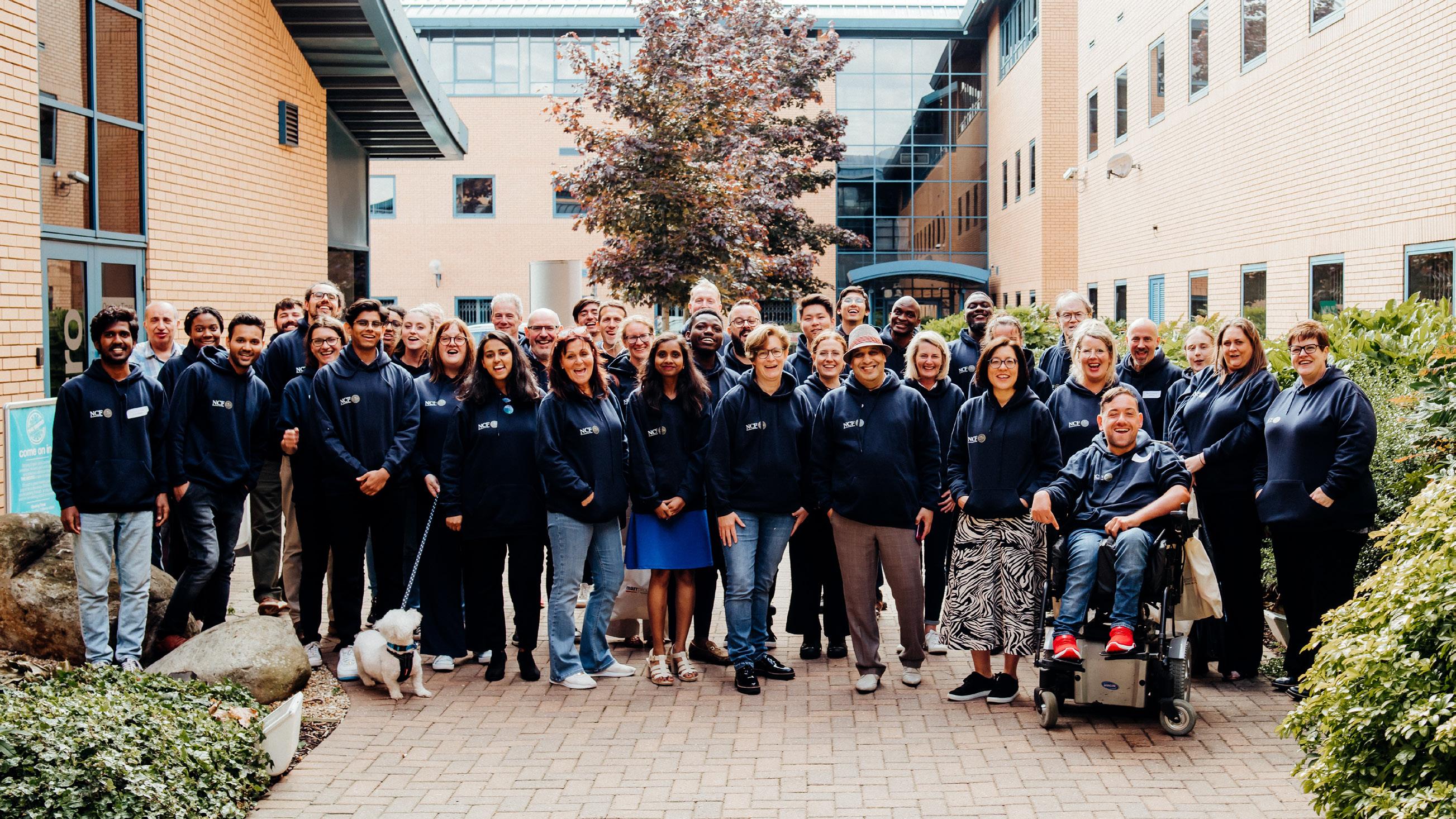
The Care Innovation Challenge is a hackathon-style creative weekend of idea generation and prototype trialling in July 2023.
With cash prizes for the top spots, expert mentoring and guaranteed media coverage this is an opportunity not to be missed.
Who can apply?
• University students
• Entrepreneurs
• Working professionals
•
• People with lived experience of care and support
You can apply as a team or as an individual. Teams must be 2-3 people. Visit www.careinnovationhub.org.uk
Gain CPD points

Access extended features and additional content
Read latest news email alerts



Comment on features and debate on important subjects

Access archived editorial
Receive a digital edition of CMM (10 issues per year)

